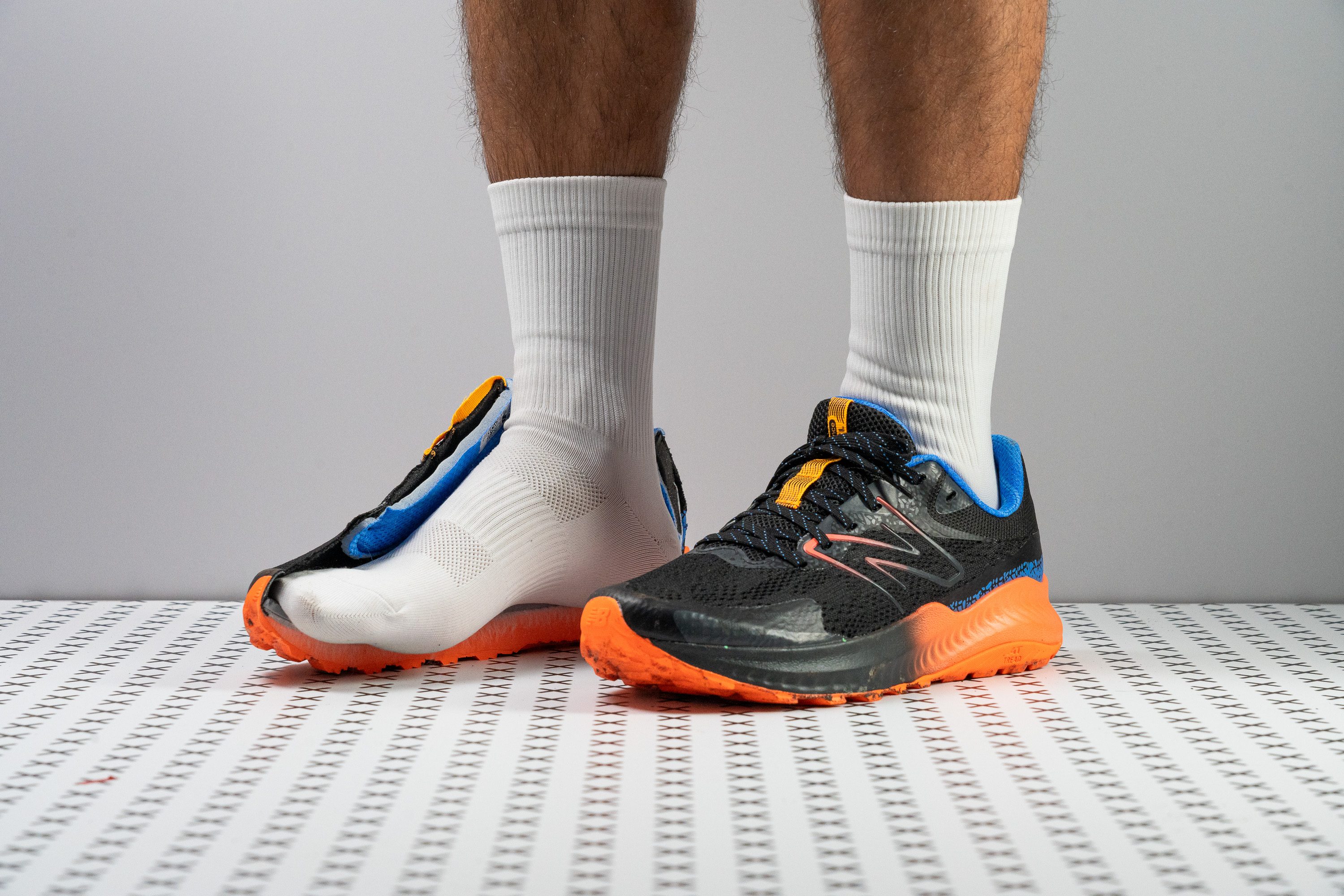Our verdict
- Top pick in best New Balance trail running shoes (2024)
Pros
- Unbeatable price
- Handles roads and light trails
- Comfortable for daily runs
- Suitable for various distances
- Surprisingly lightweight
- Offers good stability
- Breathable upper
Cons
- Poor upper durability
- Limited energy return
- Weak traction on wet surfaces
Audience verdict
Comparison
The most similar running shoes compared
+ + Add a shoe | |||||
|---|---|---|---|---|---|
| Audience score | 77 Decent! | 89 Great! | 74 Bad! | 75 Bad! | |
| Price | £90 | £170 | £100 | £90 | |
| Trail terrain | Light | LightModerate | Light | Light | |
| Shock absorption | - | - | - | Low | |
| Energy return | - | - | - | Low | |
| Arch support | Neutral | Neutral | Neutral | Neutral | |
| Weight lab Weight brand | 9.8 oz / 279g 10.3 oz / 292g | 9 oz / 255g 9.4 oz / 266g | 11 oz / 312g 11.5 oz / 326g | 10.3 oz / 291g 10.1 oz / 285g | |
| Drop lab Drop brand | 6.7 mm 6.0 mm | 6.8 mm 6.0 mm | 8.2 mm | 2.5 mm 6.0 mm | |
| Strike pattern | Mid/forefoot | Mid/forefoot | HeelMid/forefoot | Mid/forefoot | |
| Size | Slightly small | True to size | True to size | True to size | |
| Midsole softness | Balanced | Balanced | Balanced | Balanced | |
| Difference in midsole softness in cold | Normal | Normal | Small | Small | |
| Plate | ✗ | Rock plate | ✗ | ✗ | |
| Toebox durability | Very bad | Very bad | Decent | Decent | |
| Heel padding durability | Bad | Good | Bad | Decent | |
| Outsole durability | Good | Decent | Good | Good | |
| Breathability | Moderate | Warm | Moderate | Moderate | |
| Width / fit | Narrow | Narrow | Narrow | Medium | |
| Toebox width | Wide | Wide | Medium | Medium | |
| Stiffness | Stiff | Stiff | Stiff | Moderate | |
| Torsional rigidity | Moderate | Moderate | Moderate | Flexible | |
| Heel counter stiffness | Flexible | Flexible | Moderate | Moderate | |
| Lug depth | 2.9 mm | 2.9 mm | 2.9 mm | 2.7 mm | |
| Heel stack lab Heel stack brand | 29.8 mm 29.0 mm | 28.3 mm 30.0 mm | 33.8 mm | 22.7 mm 27.0 mm | |
| Forefoot lab Forefoot brand | 23.1 mm 23.0 mm | 21.5 mm 24.0 mm | 25.6 mm | 20.2 mm 21.0 mm | |
| Widths available | NormalWideX-Wide | Normal | NormalWideX-Wide | NormalWideX-Wide | |
| Season | All seasons | All seasons | All seasons | All seasons | |
| Removable insole | ✓ | ✓ | ✓ | ✓ | |
| Orthotic friendly | ✓ | ✓ | ✓ | ✓ | |
| Ranking | #640 Bottom 6% | #96 Top 26% | #369 Bottom 3% | #364 Bottom 4% | |
| Popularity | #486 Bottom 28% | #268 Bottom 30% | #321 Bottom 16% | #193 Bottom 49% |
Who should buy
We believe the budget-minded Dynasoft Nitrel v5 from New Balance is an excellent choice for:
- Adventurers who enjoy both roads and trails will appreciate this wallet-friendly pick.
- Runners who seek an easy-trail shoe that won't break the bank.
- Those looking for a do-it-all trail shoe for walking, hiking, travelling and running.
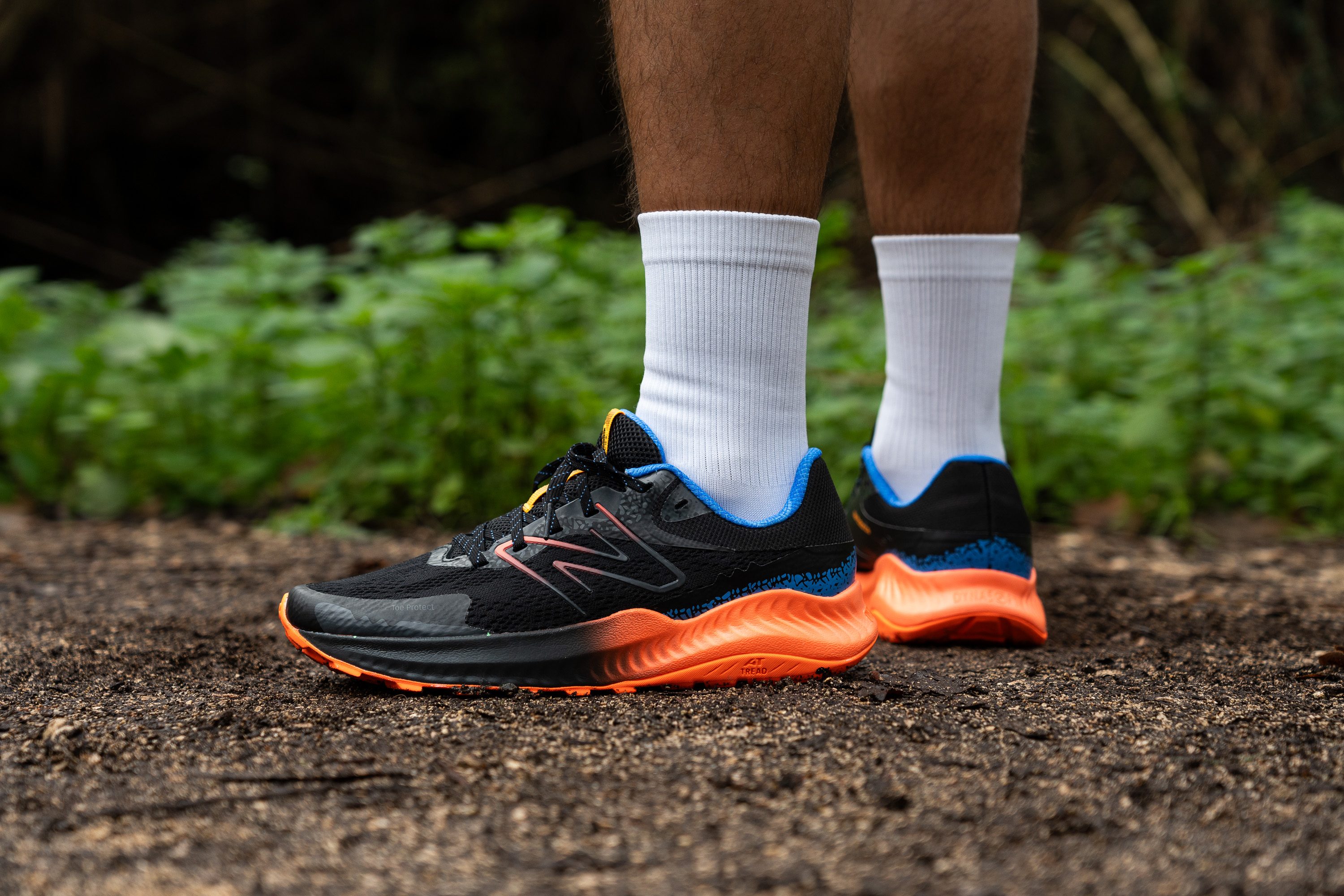
Who should NOT buy
The DynaSoft Nitrel v5 offers some pleasant surprises, but it does have limitations that warrant careful consideration. For instance, we don't recommend it for longer runs due to its modest cushioning and energy return. If you can stretch your budget just a bit, the Hoka Challenger 7 offers far superior cushioning as a hybrid shoe.
Our lab tests also revealed that the DynaSoft Nitrel v5's upper seriously lacks durability. If this is a major concern for you, we believe a sturdier, still-budget-friendly shoe like the Nike Juniper Trail 2 would be a wiser choice.
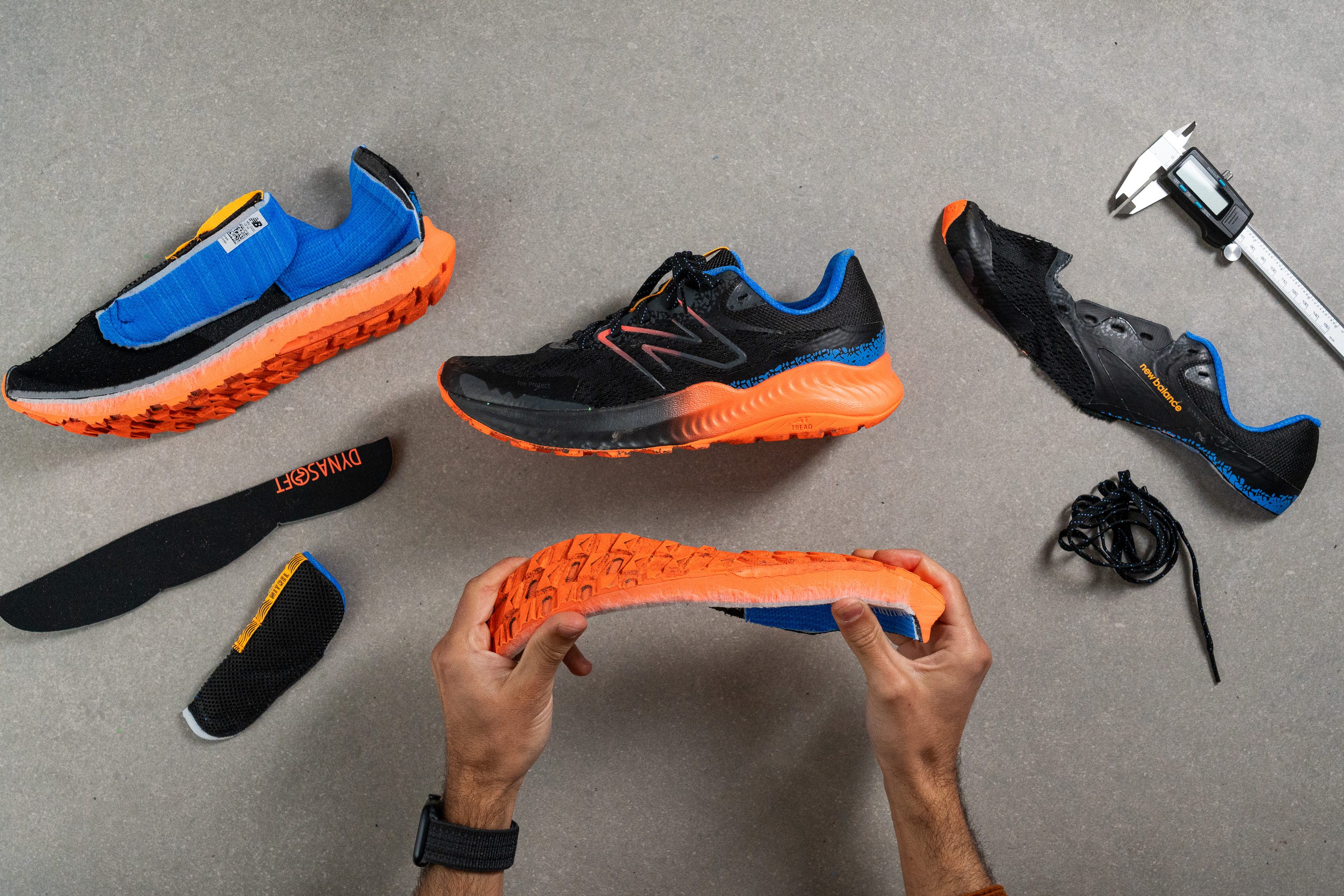
Cushioning
Heel stack
New Balance hit the sub-10-oz sweet spot by skipping the maximalist trend that's taken over the running shoe world. Just a few years ago, a 29.8 mm stack height might have qualified as tall, but today, it's noticeably leaner than the average shoe on the market.
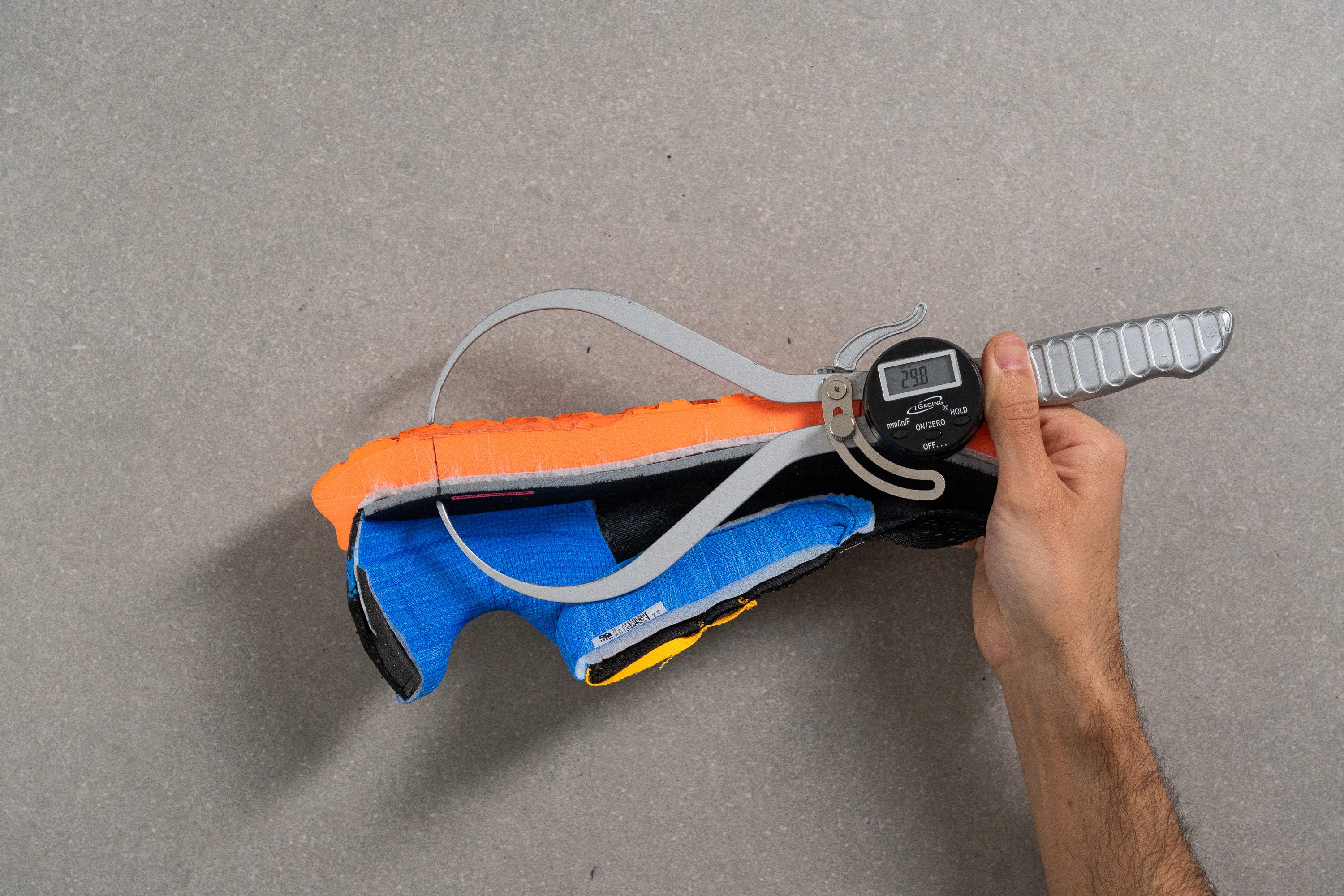
| DynaSoft Nitrel v5 | 29.8 mm |
| Average | 32.6 mm |
Forefoot stack
While lean overall, the Nitrel v5 does feature slightly more cushion in the forefoot, measuring a respectable 23.1 mm with our digital callipers.
This balanced stack height makes the shoe suitable for a variety of runs, but might feel a bit thin for ultra-distance efforts.
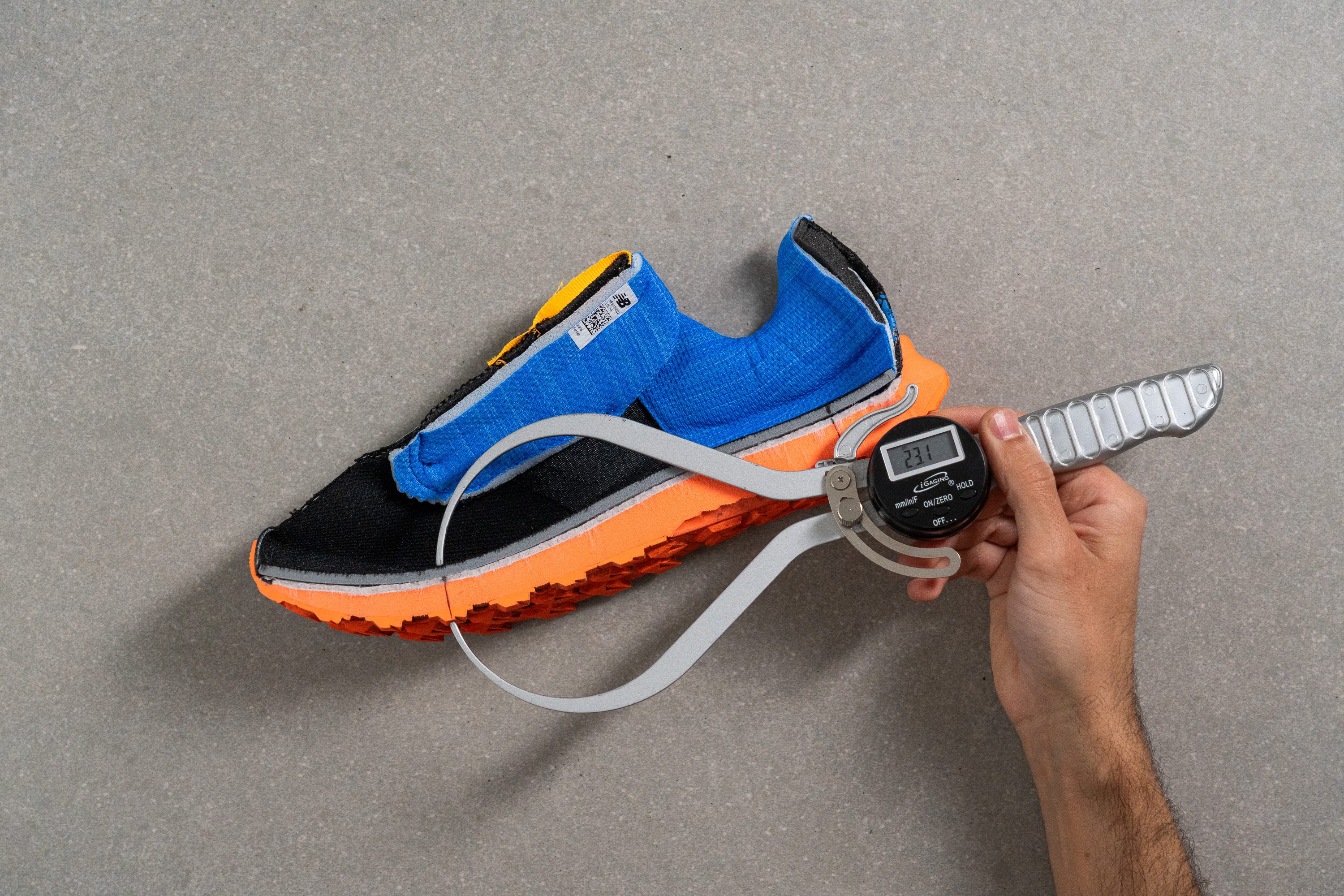
| DynaSoft Nitrel v5 | 23.1 mm |
| Average | 25.1 mm |
Drop
The "drop" of a shoe refers to the height difference between heel and forefoot, and in this case, it's a comfortable 6.7 mm. While adaptable to most running styles, we think this moderate drop makes the shoe an especially good fit for midfoot strikers.
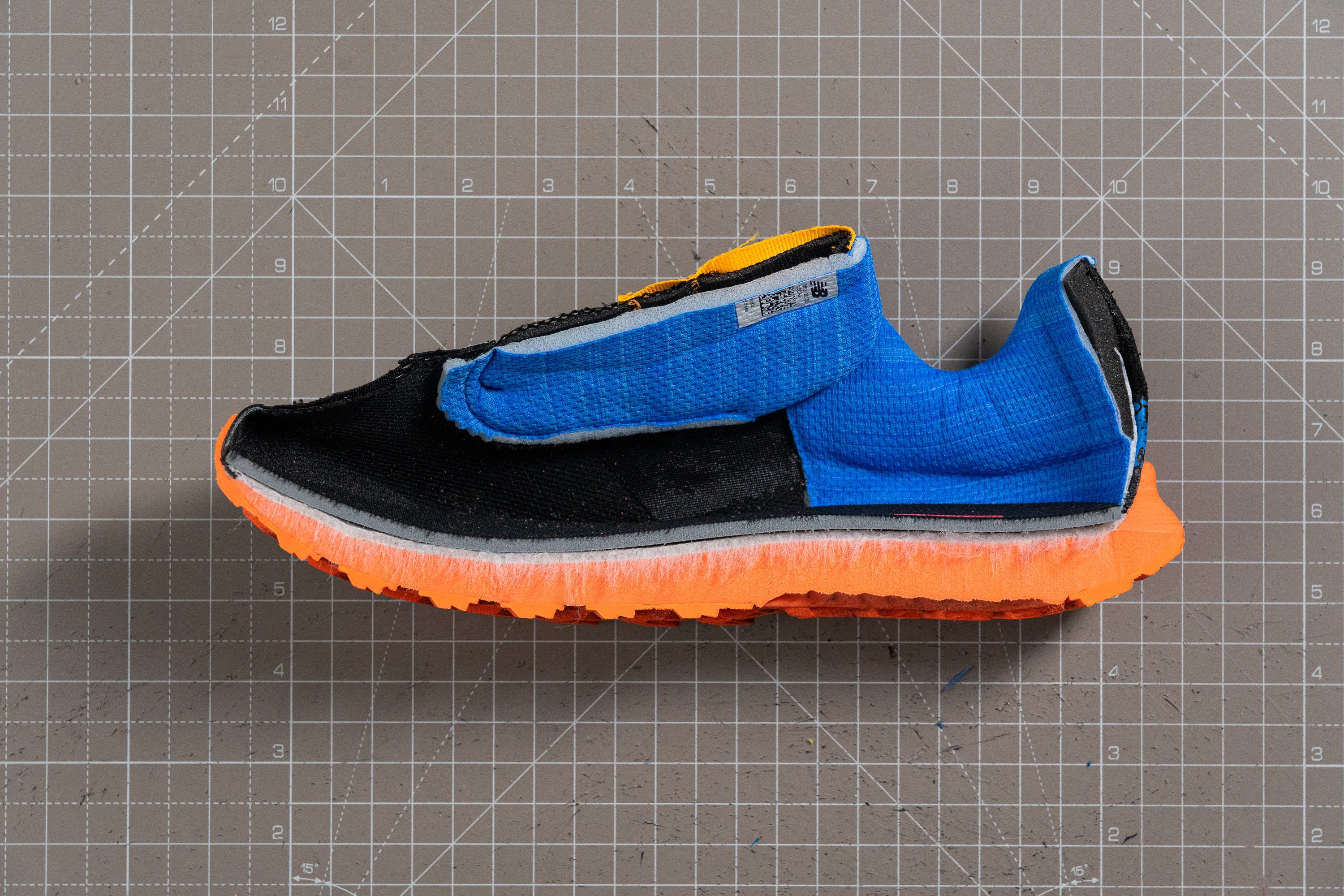
| DynaSoft Nitrel v5 | 6.7 mm |
| Average | 7.6 mm |
Midsole softness
The shoe sits on a midsole crafted from New Balance's EVA-based DynaSoft foam.
We measured it at a moderately soft 20.5 HA on our durometer, a versatile sweet spot that tackles a variety of surfaces like asphalt, gravel roads or easy trails with ease. In our view, a significantly softer feel in this shoe would likely introduce too much instability for uneven terrain.
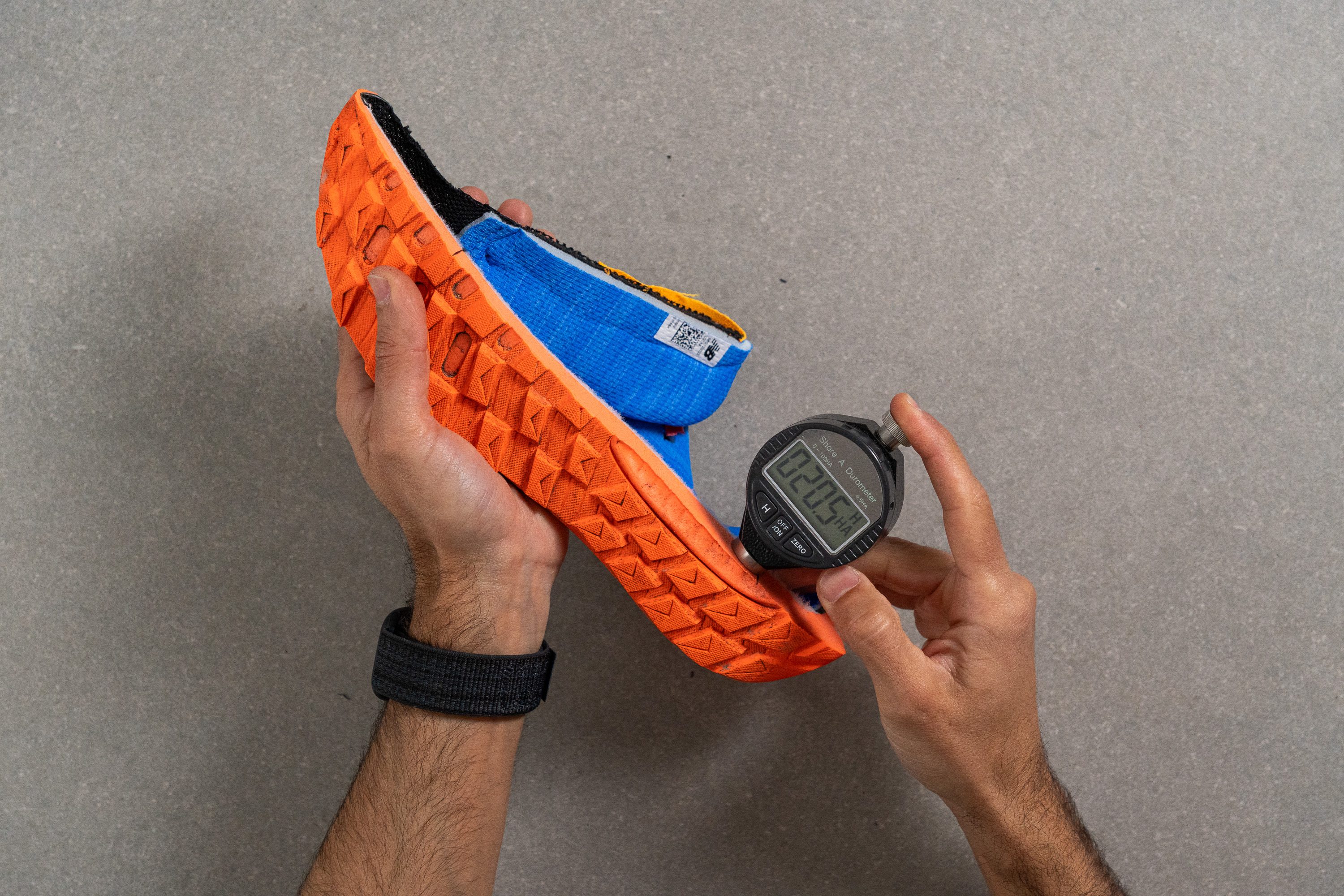
| DynaSoft Nitrel v5 | 20.5 HA |
| Average | 22.0 HA |
Size and fit
Size
New Balance DynaSoft Nitrel v5 fits slightly small (120 votes).
Internal length
| DynaSoft Nitrel v5 | 268.3 mm |
| Average | 269.0 mm |
Width / Fit
Now, back to the fit! In an effort to be unbiased, we always try shoes on before measuring the upper.
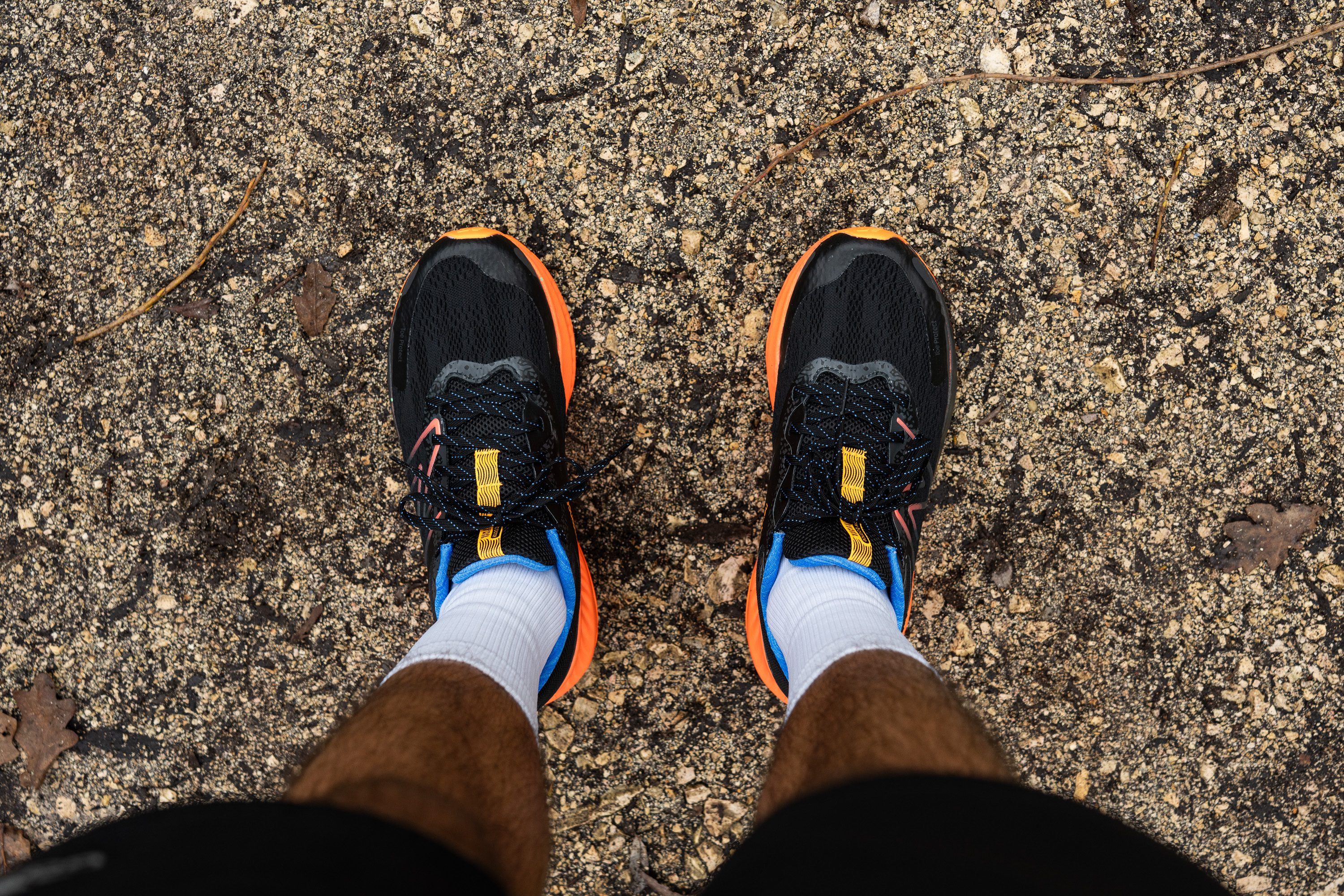
The Nitrel v5 offered a classic, average fit. To back up this first impression, we measured the widest part of the upper—and our caliper validated our initial feeling with a reading of 98.3 mm.
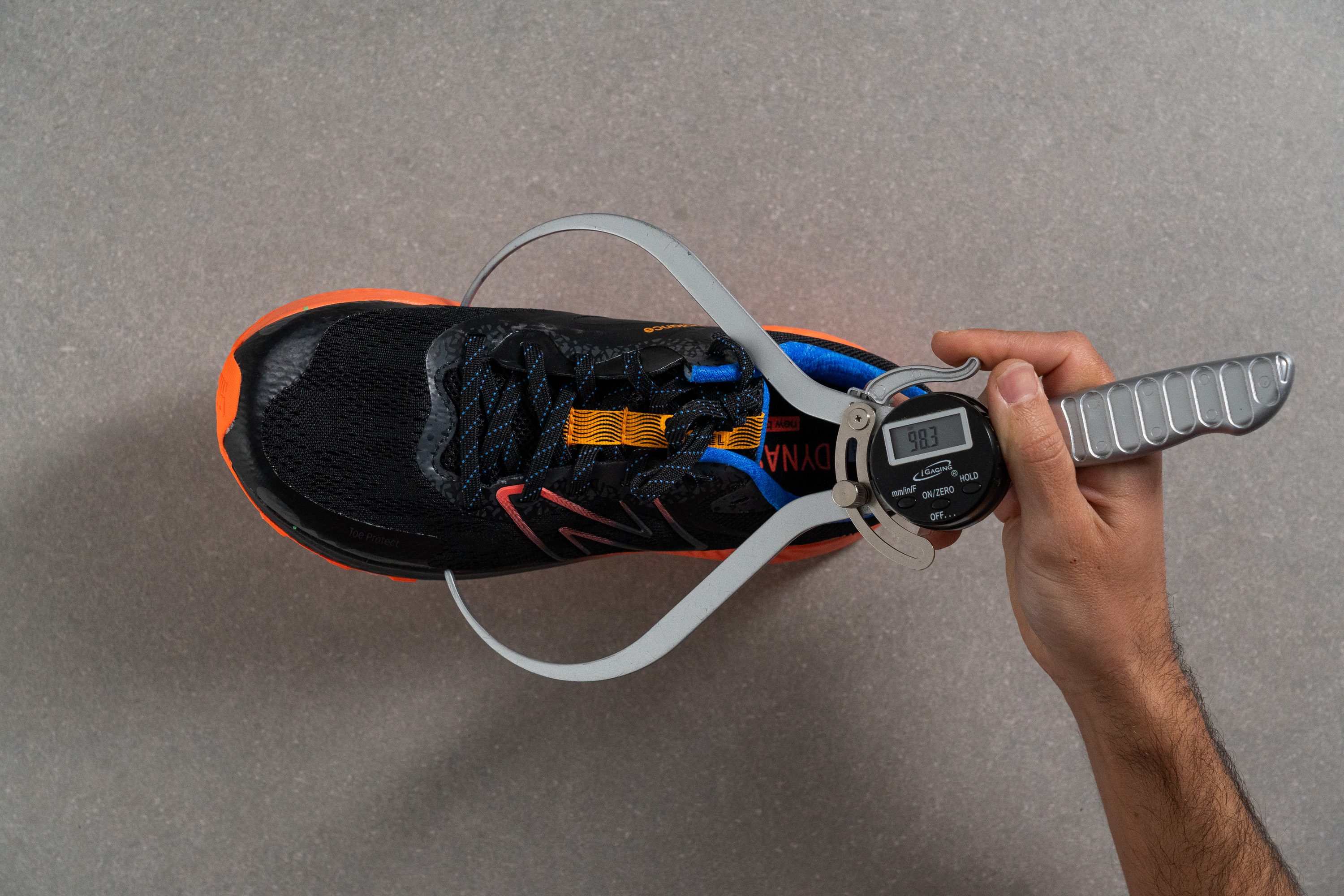
This test follows an older methodology, which is why you don't see recently tested shoes in the chart. Results from different methodologies can not be compared.
| DynaSoft Nitrel v5 | 98.3 mm |
| Average | 98.9 mm |
Toebox width
There's ample room for toes to splay without feeling cramped, as the lack of aggressive tapering offers generous space. Our measurement confirmed this spacious feel with a reading of 80.7 mm.
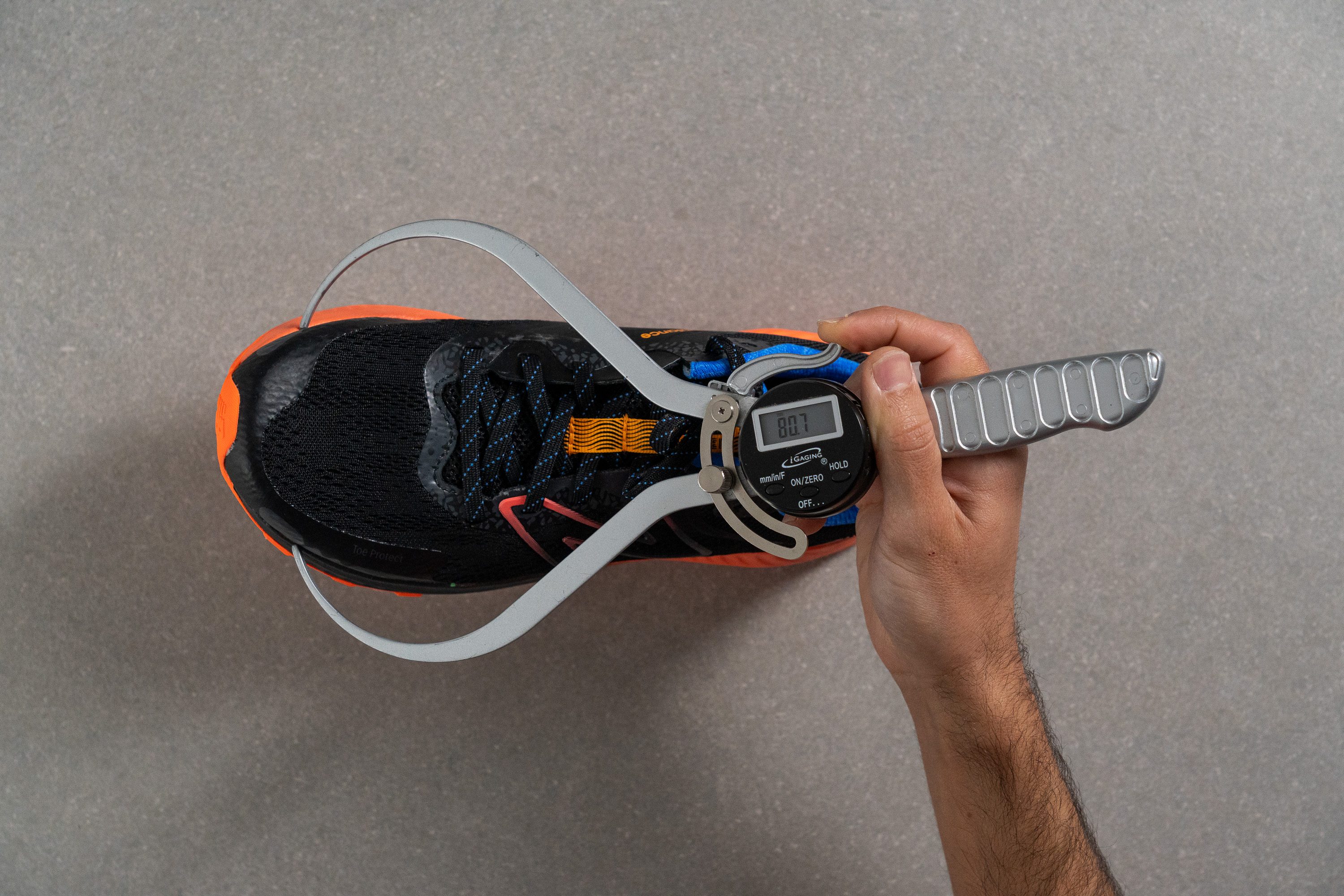
This test follows an older methodology, which is why you don't see recently tested shoes in the chart. Results from different methodologies can not be compared.
| DynaSoft Nitrel v5 | 80.7 mm |
| Average | 79.3 mm |
Traction / Grip
Lug depth
Now, circling back to the outsole—those lugs sure look shallow! With our vernier caliper, we confirmed this impression at just 2.9 mm, the perfect height for a versatile shoe that balances trail grip and on-road comfort. More aggressive lugs would create an unpleasant, clunky feel on pavement.
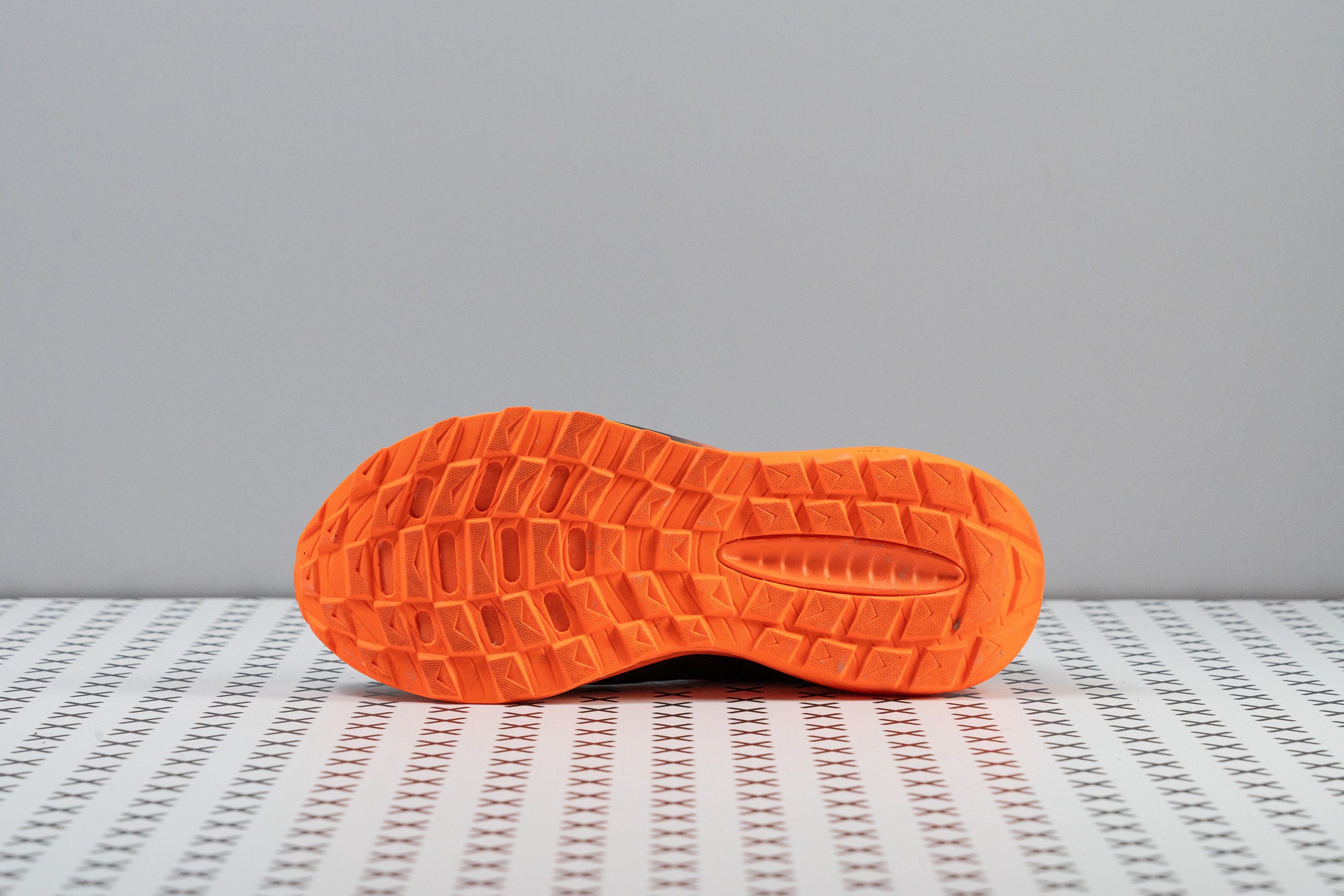
However, it's crucial to know the Nitrel v5 has its limits. The simple rectangular lugs, while sporting some subtle grooves for added bite on softer surfaces, won't cut it in truly challenging, muddy conditions. That said, these smaller lugs still deliver an impressively solid performance on well-maintained trails!
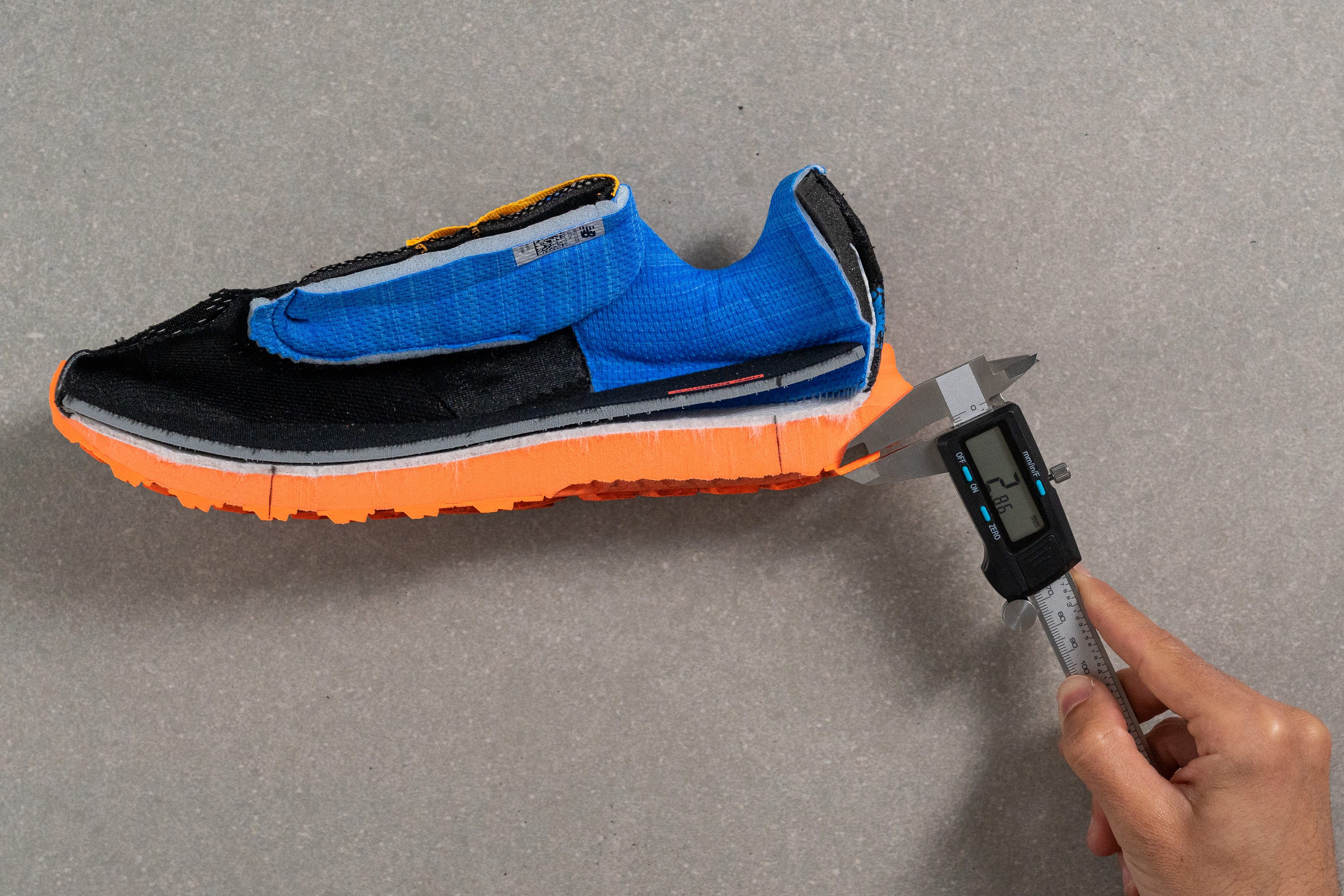
| DynaSoft Nitrel v5 | 2.9 mm |
| Average | 3.5 mm |
Flexibility / Stiffness
Flexibility is key for versatile, jack-of-all-trades shoes, and the Nitrel v5 delivers well! We were happy with its performance in our torsional rigidity test, but we wanted to go further.
It only took 23.0 N of force to bend the shoe to our desired 90-degree angle. While not super-flexible, the Nitrel v5 achieves a fantastic balance of support and comfort for this type of shoe.
This test follows an older methodology, which is why you don't see recently tested shoes in the chart. Results from different methodologies can not be compared.
| DynaSoft Nitrel v5 | 23.0N |
| Average | 27.1N |
Stiffness in cold (%)
The DynaSoft EVA foam holds its own under chilly conditions—just like our re-measurement of midsole softness—we only detected a 21.3% increase in stiffness after our standard 20-minute freezer test.
This respectable performance further solidifies the shoe's suitability for multiple climates.
| DynaSoft Nitrel v5 | 21% |
| Average | 32% |
Weight
When we first handled the Nitrel v5 in the lab, it had a nicely lightweight feel—and our scale confirmed this impression!
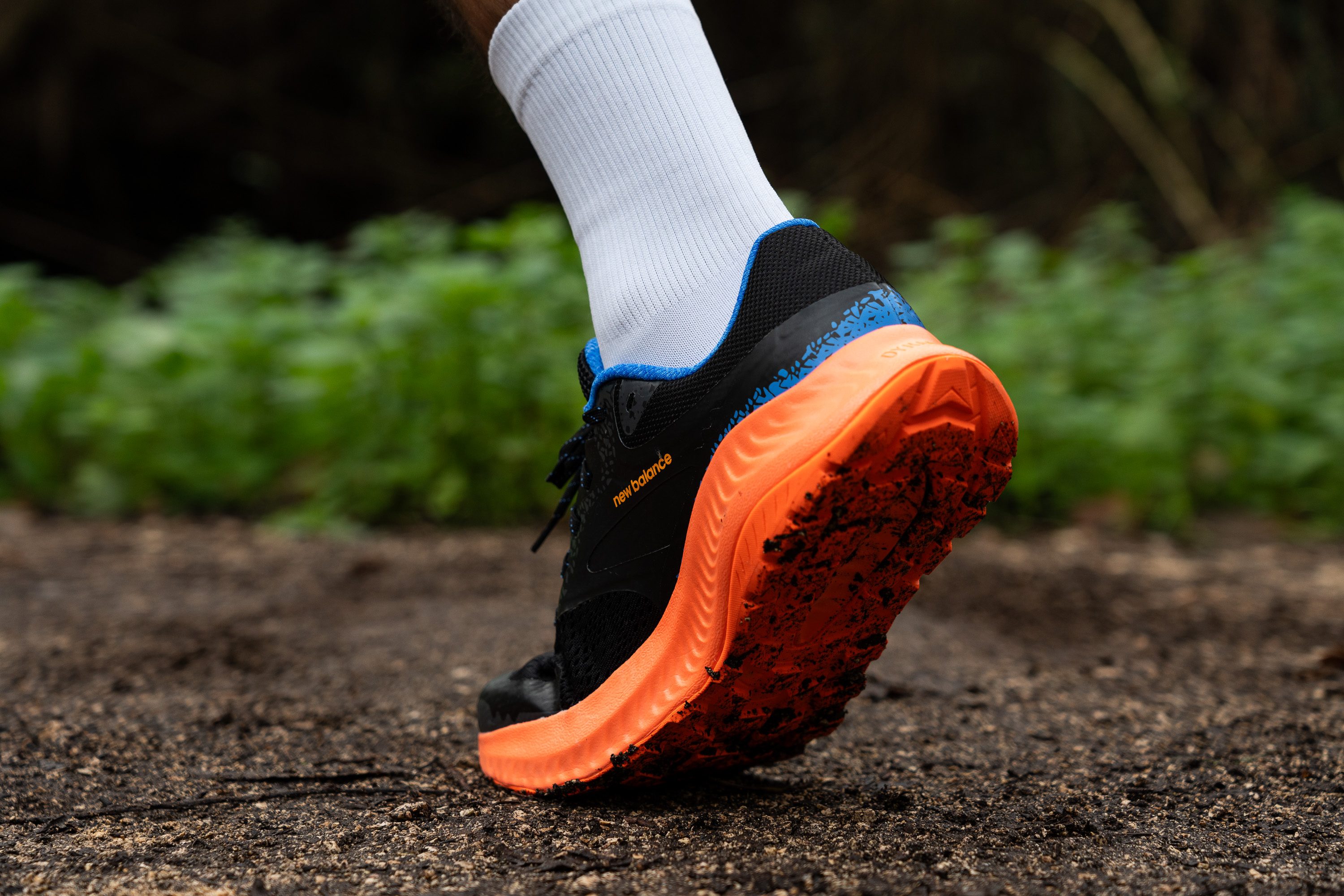
At 9.8 oz (279g), this shoe boasts balanced lightness, even compared to strictly road-focused models. In fact, it's rare to find a cheap trail shoe like this cracking the 10-oz barrier.
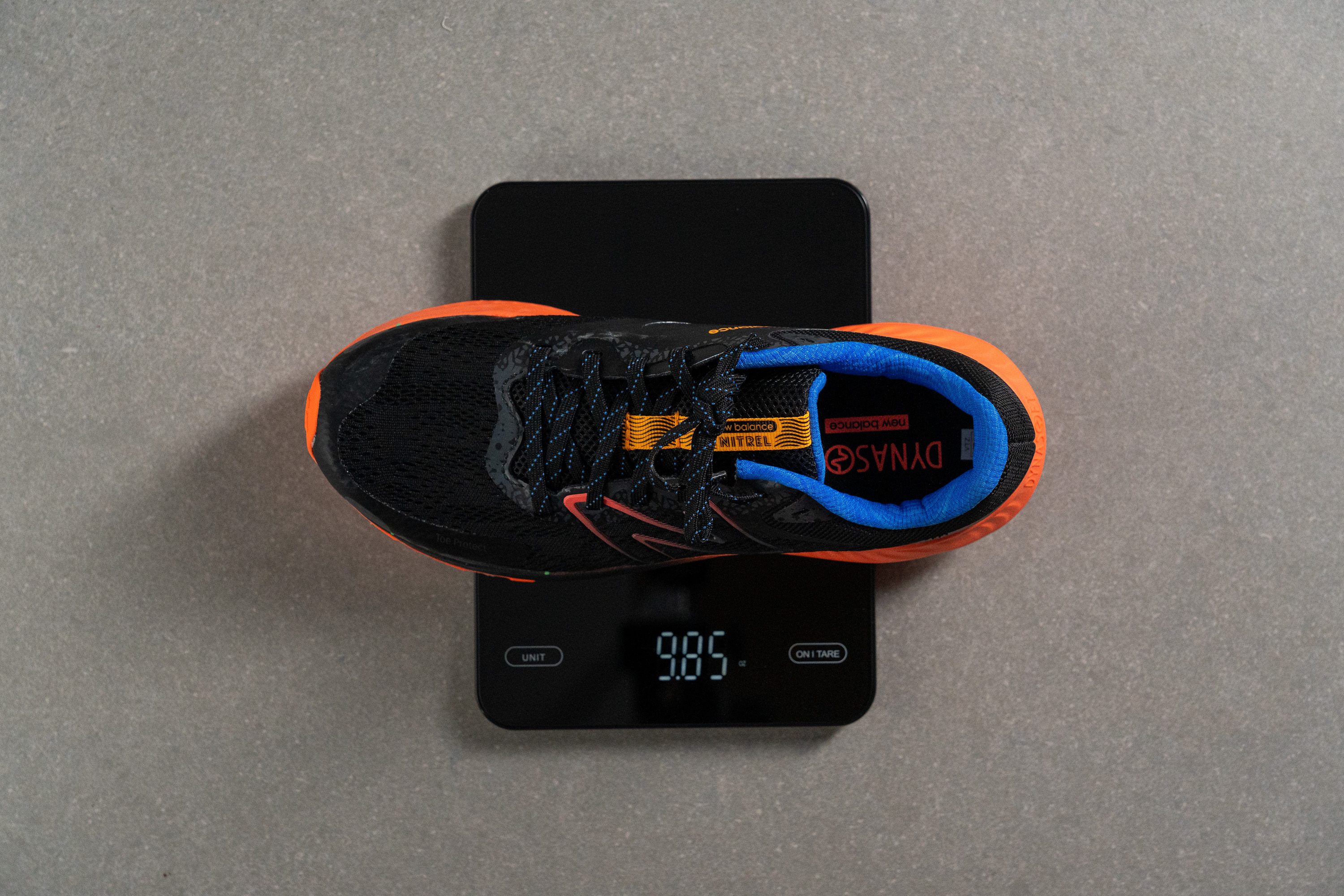
| DynaSoft Nitrel v5 | 9.8 oz (279g) |
| Average | 10.2 oz (289g) |
Breathability
One big perk of road-to-trail hybrids compared to pure trail runners is superior breathability. These versatile shoes typically combine airy road running uppers with extra protective layers. Does the budget-friendly Nitrel v5 fit the bill here?
Happily, we found the airflow great—earning a 4/5 in our smoke test thanks to the generous ventilation holes.
Our light test pinpointed the main source of airflow, starting in the toebox. However, airflow halts in the midfoot as additional structure kicks in for stability. Just the way it should be.
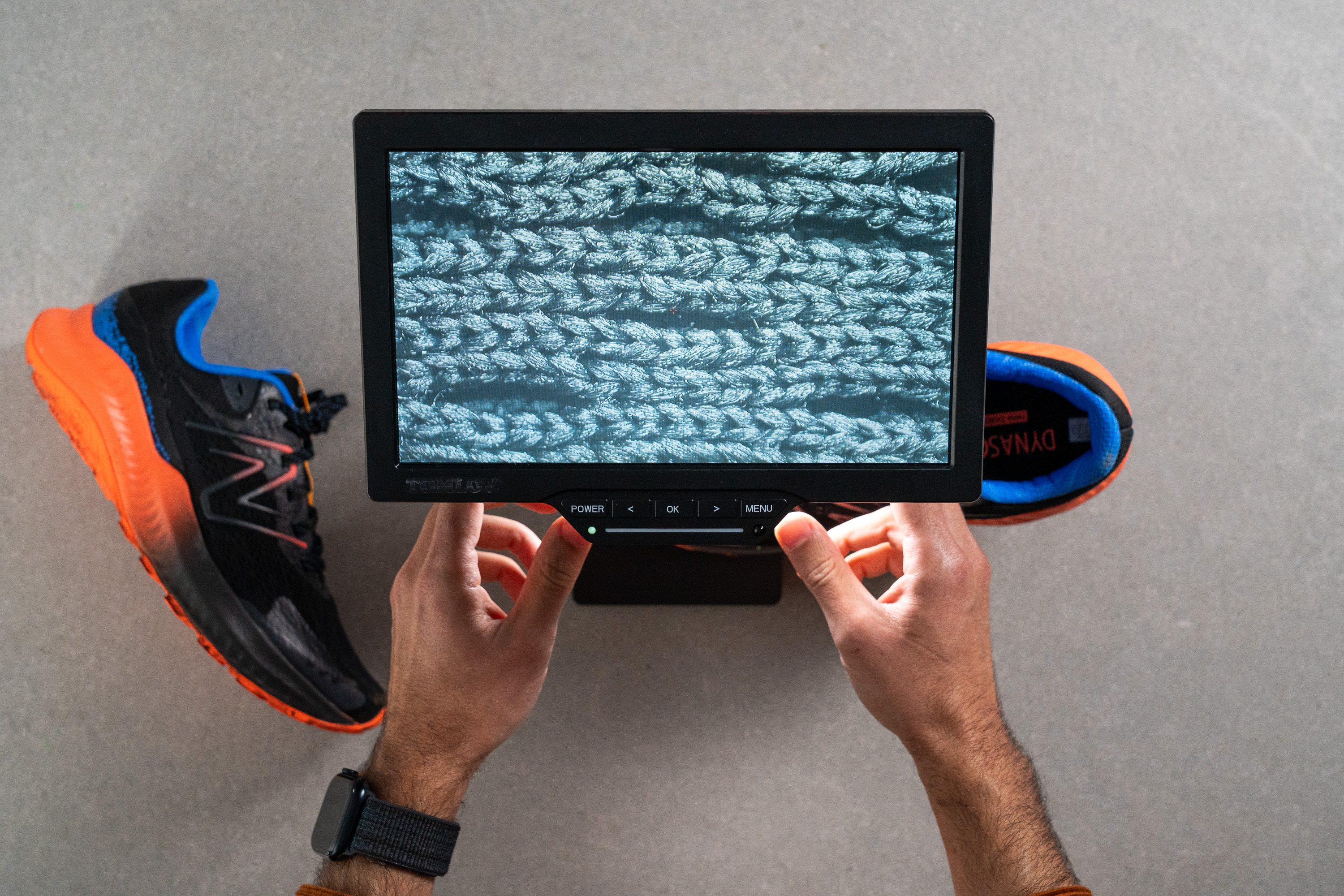
A closer look under the microscope revealed a surprisingly thick engineered mesh peppered with ventilation holes. This underscores the value of doing multiple tests in the lab.
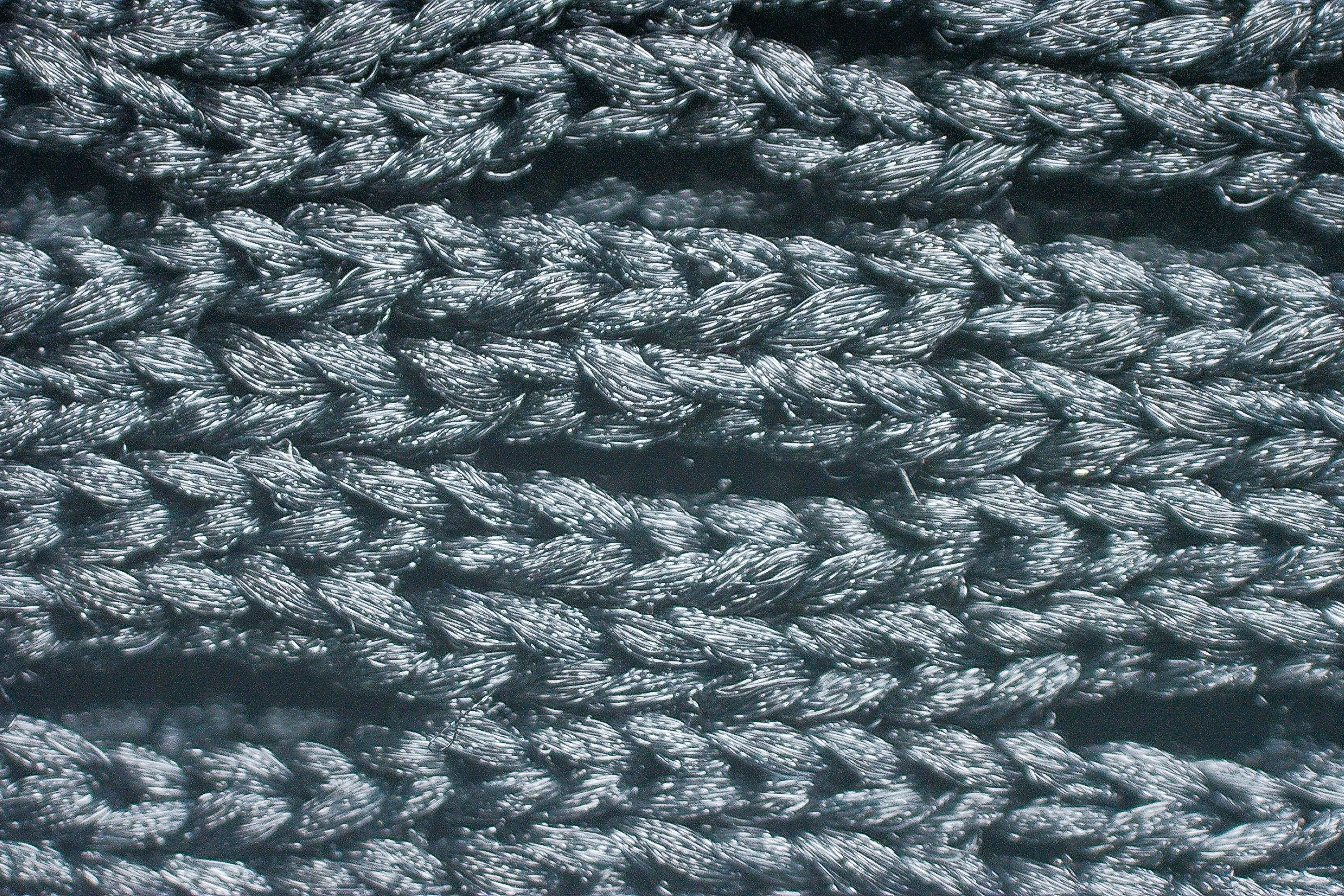
Finally, a hands-on inspection revealed a incredibly plush interior padding for being a £80 shoe.
We also noted plenty of overlays, including New Balance's Toe Protect, for a welcome touch of added durability in the toe cap.
| DynaSoft Nitrel v5 | 4 |
| Average | 3.3 |
Stability
Lateral stability test
New Balance integrated midsole sidewalls at the heel and midfoot to enhance stability—making this a great pick for neutral runners seeking a steady, sure-footed ride even on trails.
Torsional rigidity
Remember, this shoe targets versatility, so it needs to be comfy enough for everything from leisurely park walks to trail hikes.
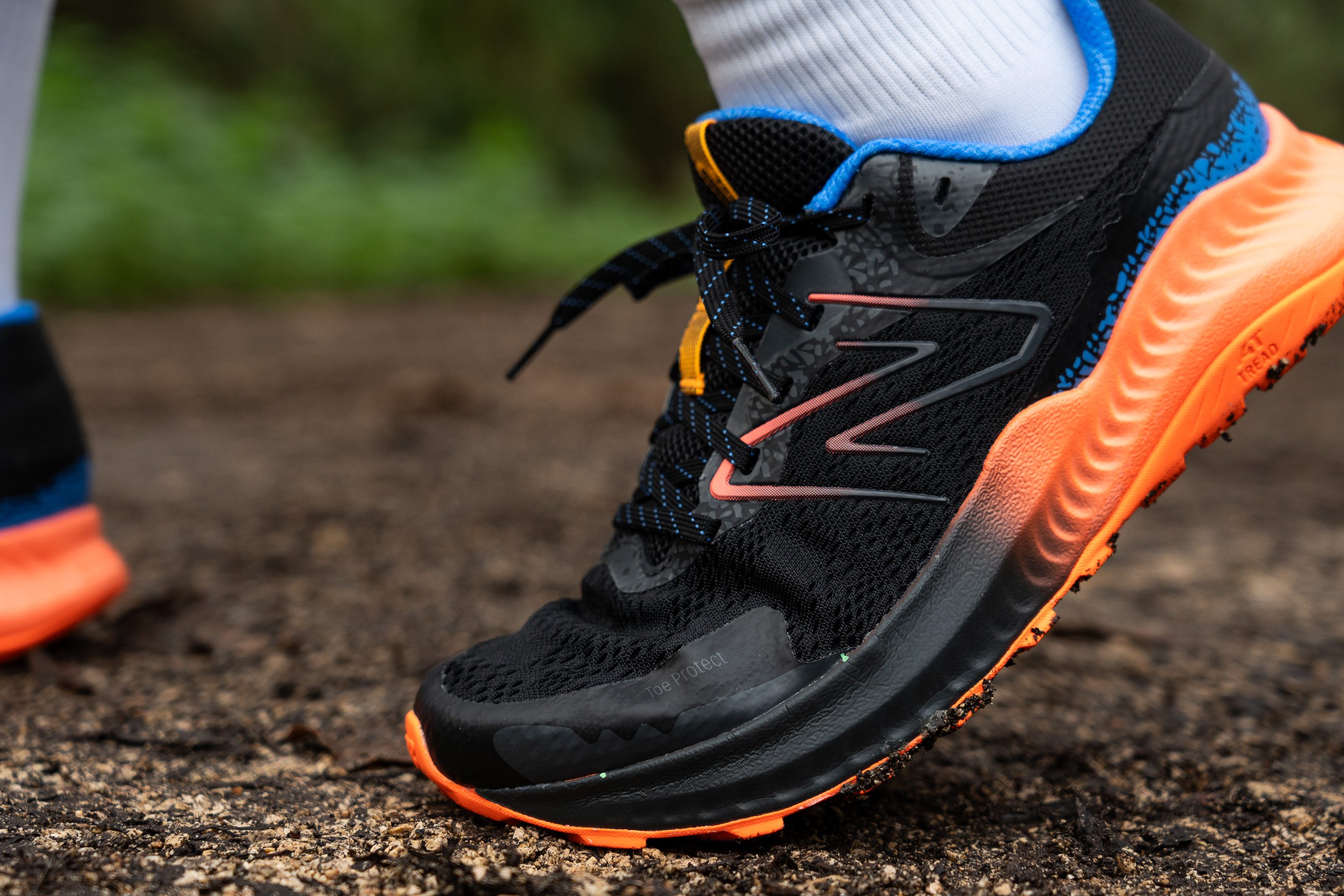
Overly stiff shoes make for miserable non-running activities. With that in mind, the Nitrel v5 strikes a great balance between responsiveness and flexibility, earning it a solid 3/5 on our torsional rigidity test.
| DynaSoft Nitrel v5 | 3 |
| Average | 3.6 |
Heel counter stiffness
The heel counter mirrors the overall design priority of comfort over rock-solid stability, which we believe it's an entirely appropriate choice for this shoe.
This translates to a comfortable fit with just enough structure to keep your heel in place, earning it a 2/5 on our scale.
| DynaSoft Nitrel v5 | 2 |
| Average | 3 |
Midsole width - forefoot
Turning our attention to the midsole, we measured a fairly average 109.9 mm at the widest part of the forefoot. This neutral design further underscores the shoe's ideal fit for runners without major stability needs.
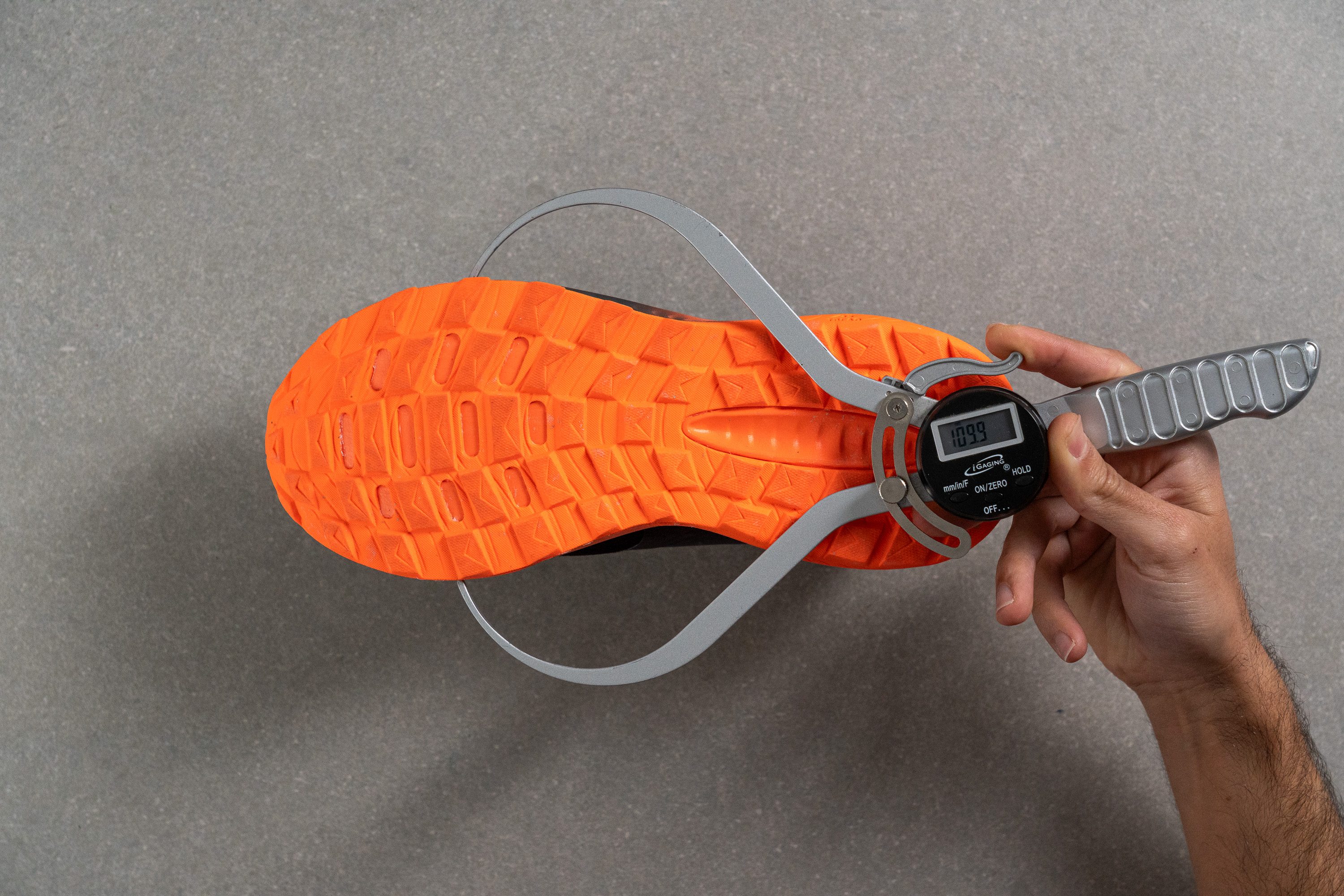
| DynaSoft Nitrel v5 | 109.9 mm |
| Average | 112.8 mm |
Midsole width - heel
Our heel measurement revealed a generously wide 95.6 mm, fantastic news for heel strikers!
This design, along with the Nitrel v5's beginner-friendly price tag, clearly signals New Balance's intention to make this shoe incredibly welcoming for novice runners in search of a do-it-all shoe.
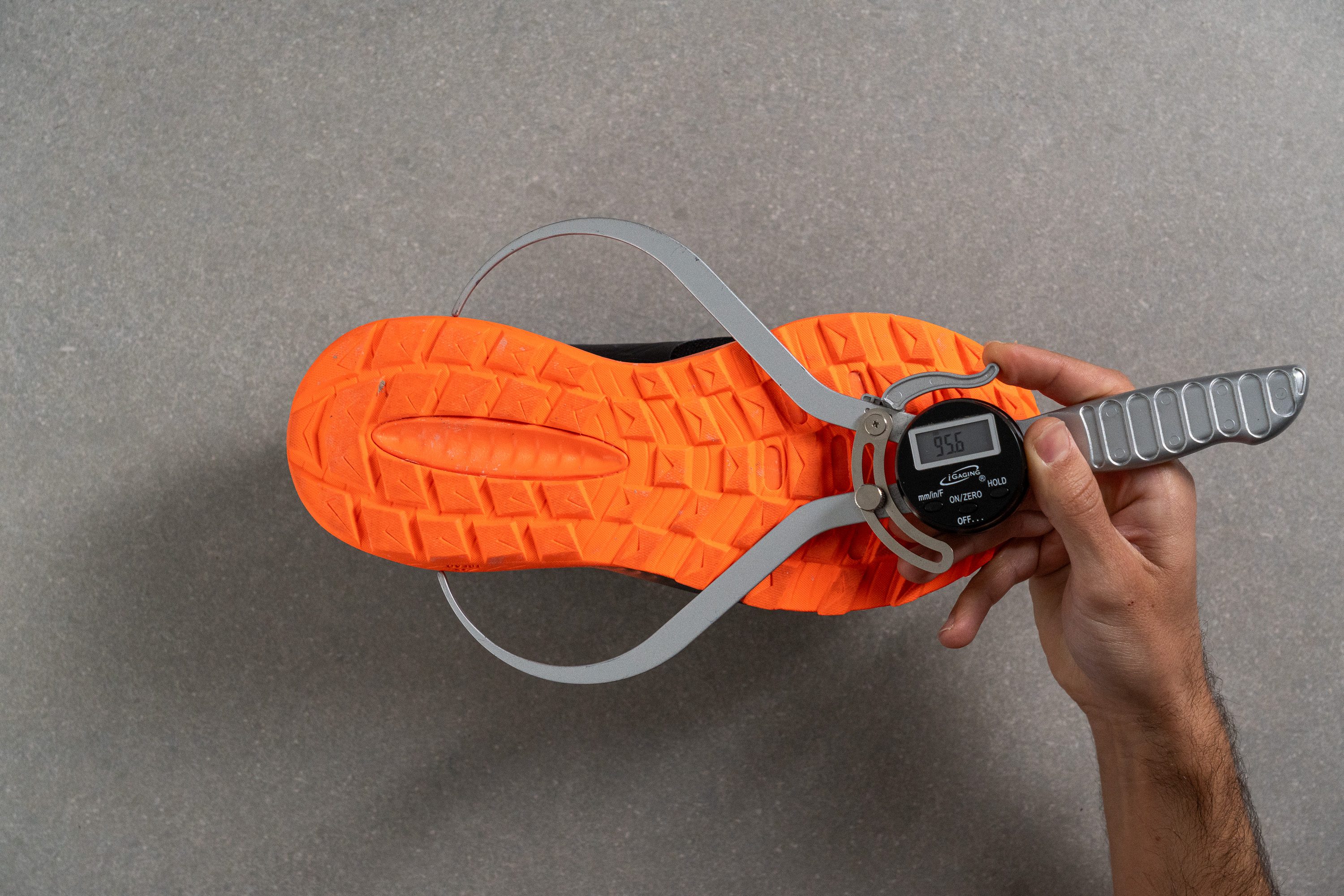
| DynaSoft Nitrel v5 | 95.6 mm |
| Average | 89.9 mm |
Durability
Toebox durability
New Balance's Toe Protect feature makes an appearance on the Nitrel v5 as we said just before, though it doesn't extend far enough into the toebox. For this reason, the upper was no match for our Dremel test—it practically tore through the upper.
While the mesh feels cosy enough, it falls short on durability. Our Dremel test confirmed this, giving the Nitrel v5 the worst possible score, a dismal 1/5.
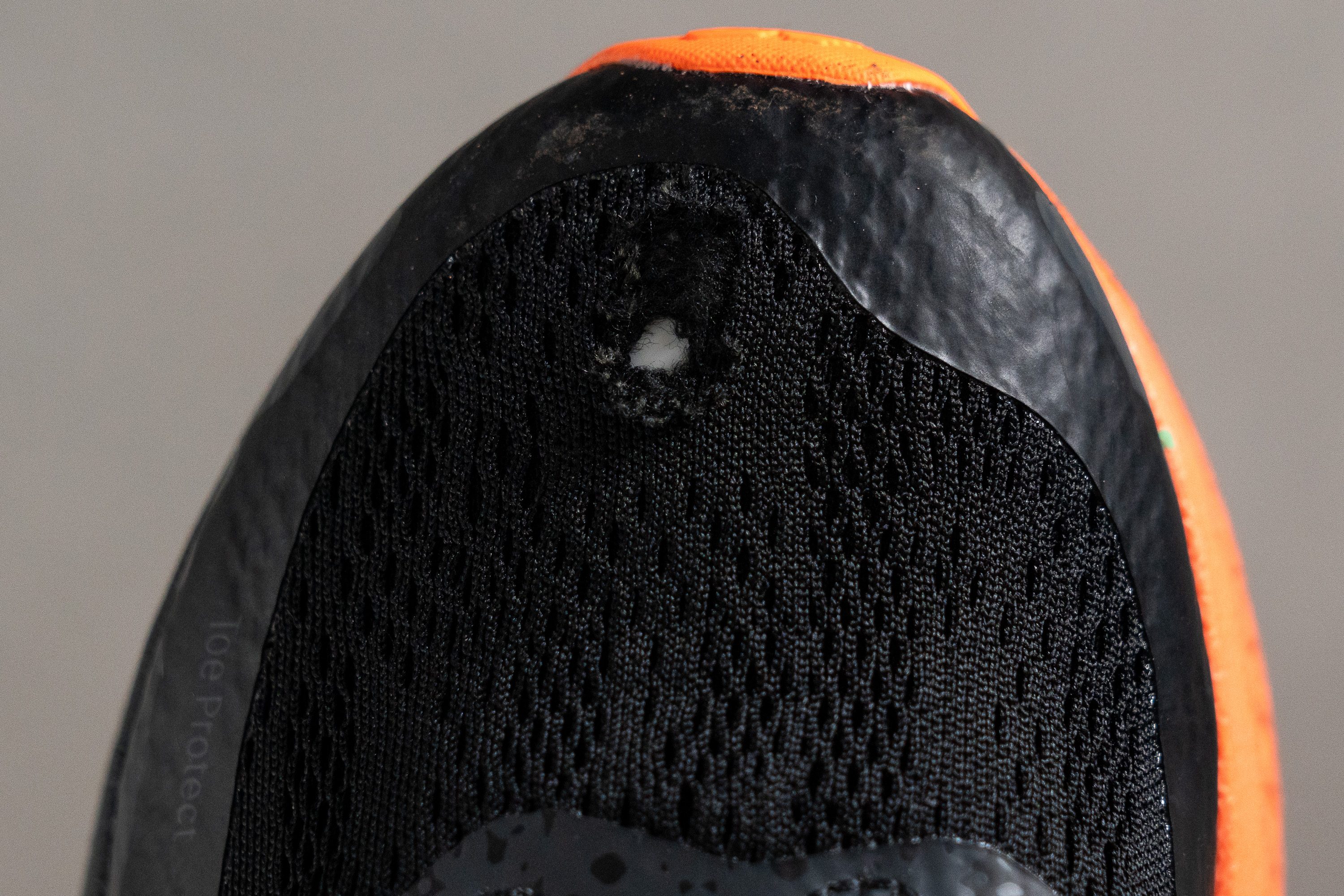
| DynaSoft Nitrel v5 | 1 |
| Average | 3.1 |
Heel padding durability
While low toebox durability scores are somewhat expected from a door-to-trail shoe, heel padding durability should be better.
Sadly, our Dremel test on the Achilles area was another brutal disappointment—the tool destroyed this part of the shoe, earning the Nitrel v5 another dismal 1/5 score.
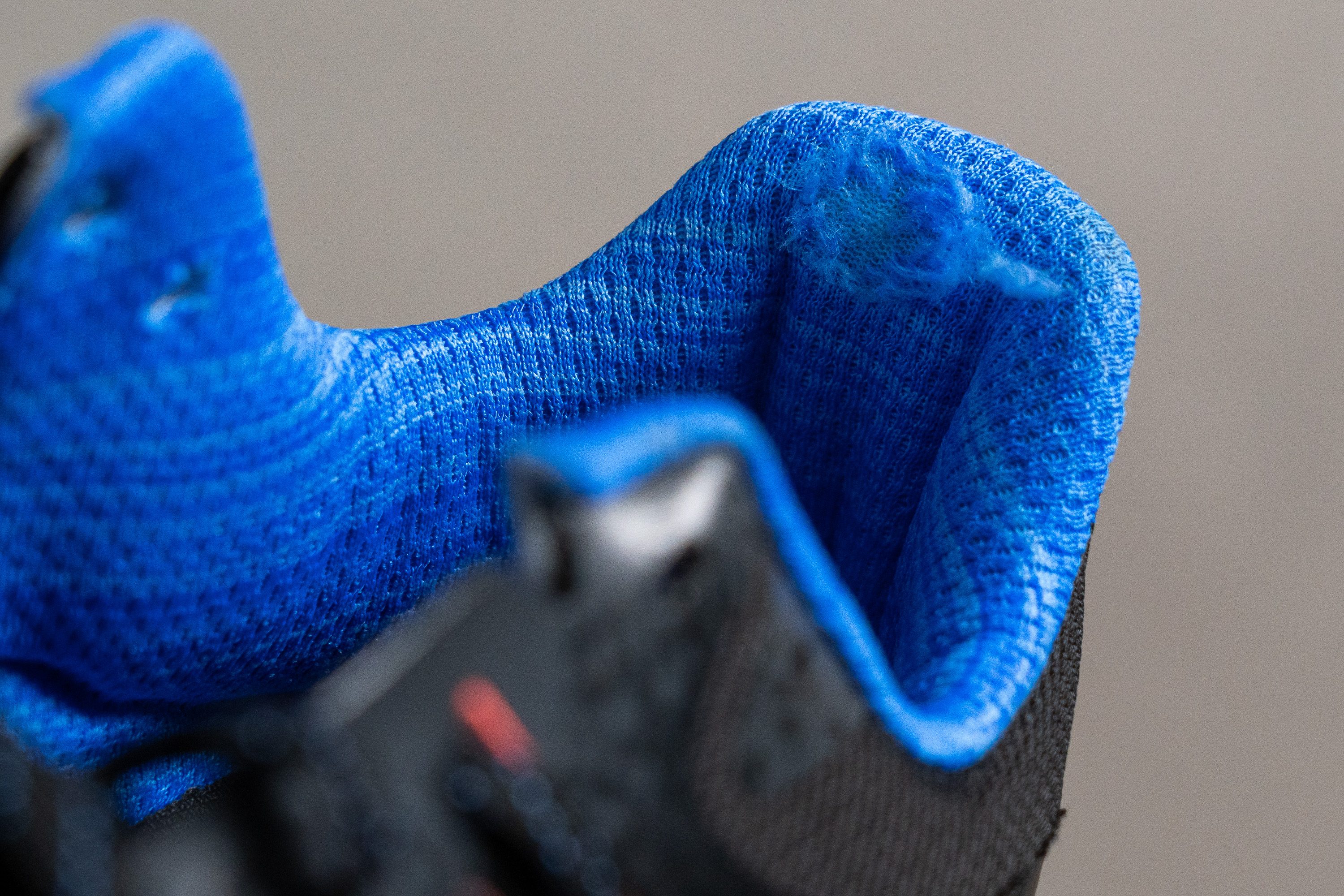
| DynaSoft Nitrel v5 | 1 |
| Average | 3 |
Outsole hardness
Two brutal durability tests down, we were hoping for better luck with the AT Tread outsole.
Before hitting it with the Dremel, we assessed the hardness using our durometer—it landed at a fairly standard 86.8 HC for trail shoes. Now for the moment of truth…
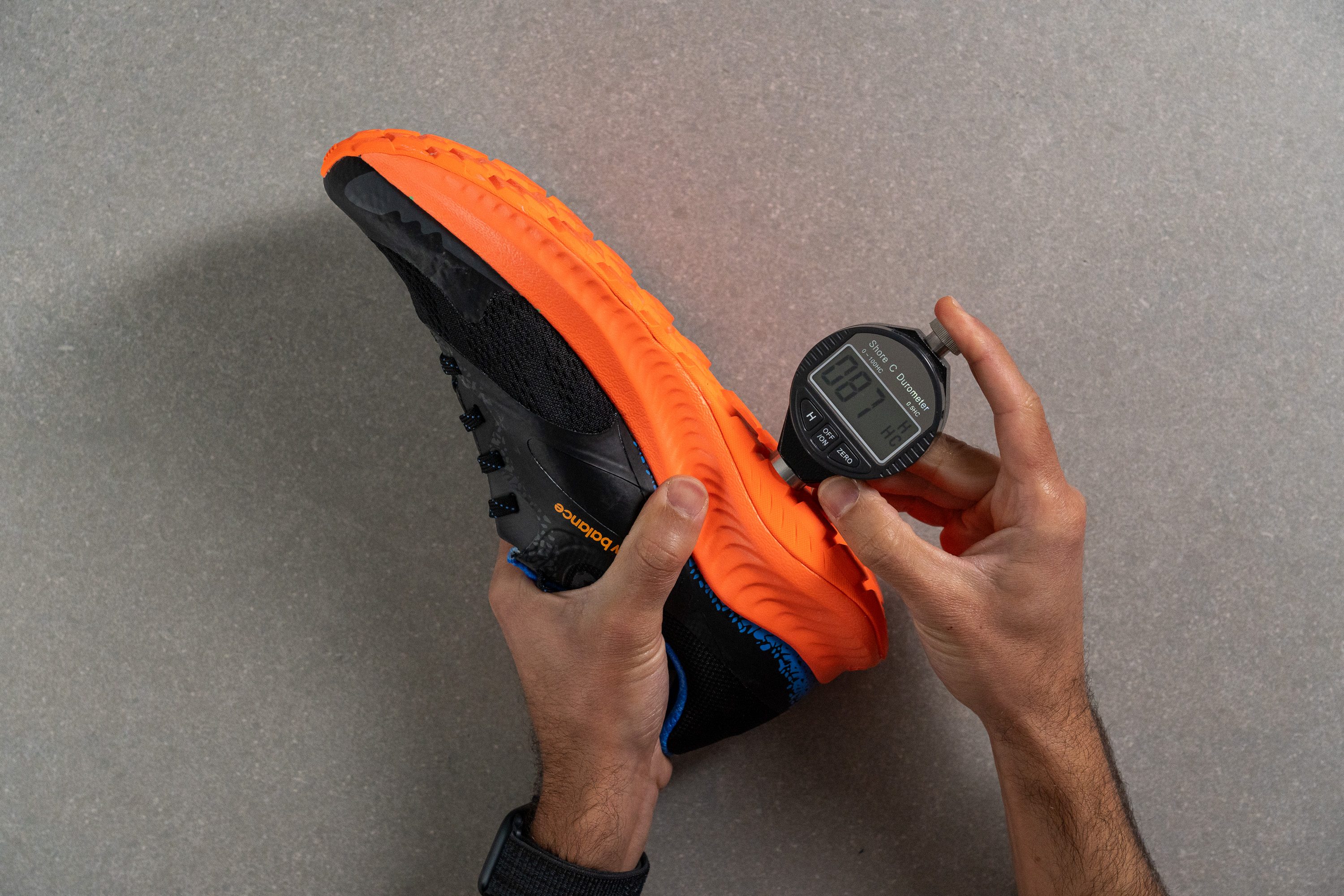
| DynaSoft Nitrel v5 | 86.8 HC |
| Average | 85.8 HC |
Outsole durability
We were happy with the performance the AT Tread outsole! NB promise this versatile outsole can handle a variety of terrains, and our lab and real-world tests confirm that—although it may not be the top performer in any single scenario, it holds its own across the board.
Our Dremel test delivered a nice surprise, a modest 0.9-mm indentation. While not the absolute best result, it's still solid performance for a budget-friendly trail shoe like this!
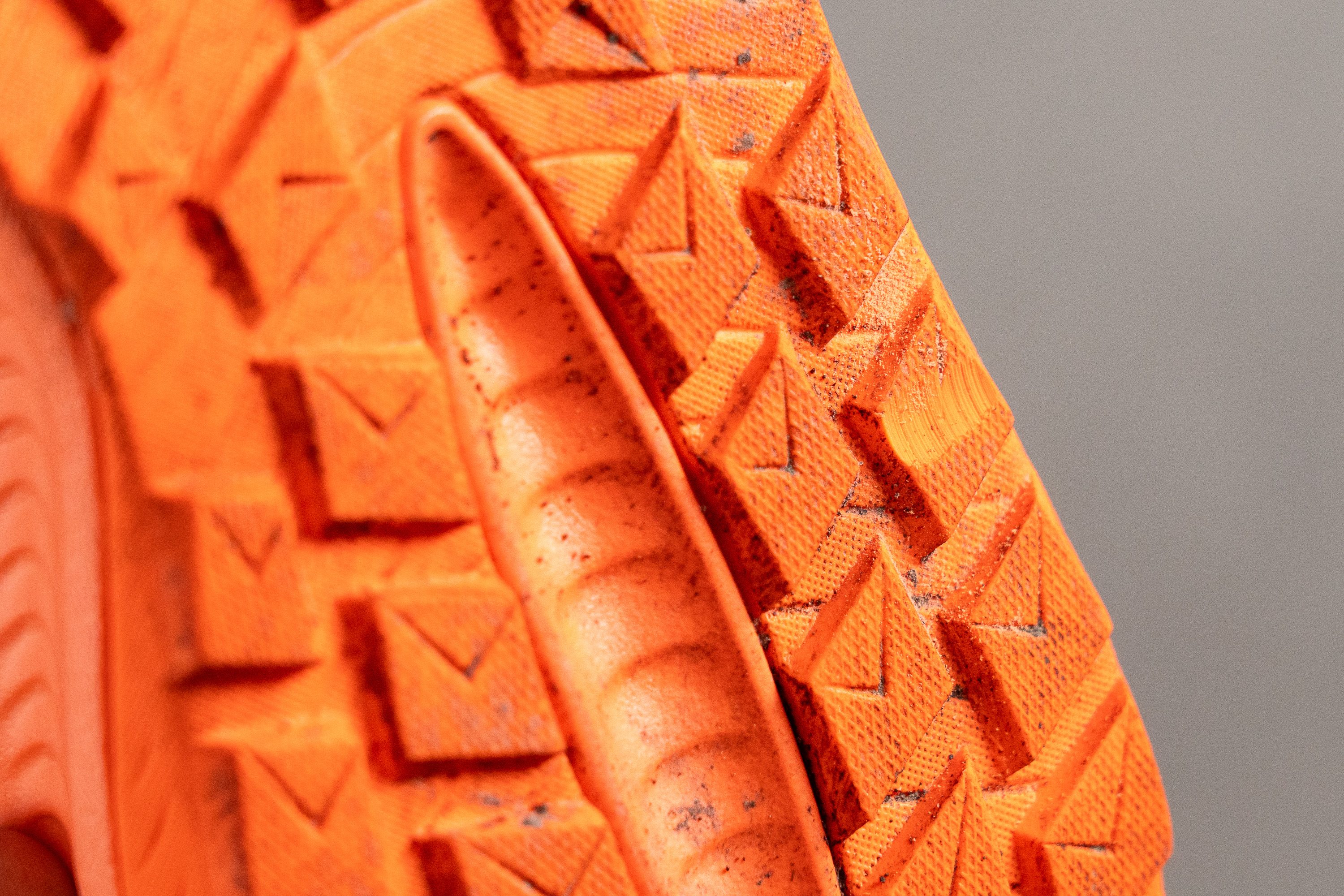
| DynaSoft Nitrel v5 | 0.9 mm |
| Average | 0.9 mm |
Outsole thickness
The solid durability results likely influenced New Balance's decision to use a thinner-than-usual outsole here.
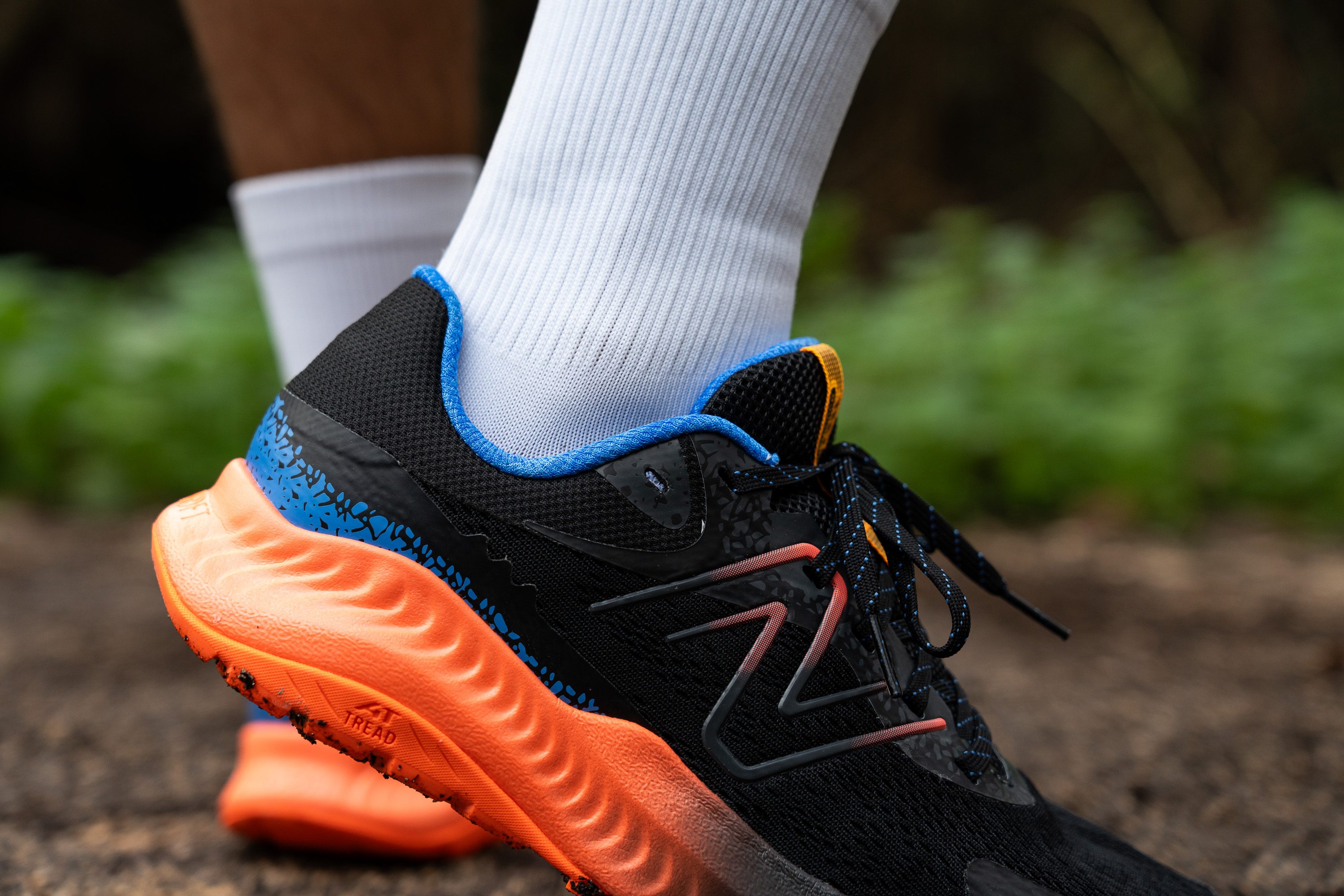
Measuring in at just 1.8 mm, this design makes perfect sense for a shoe destined for occasional road use. After all, thick outsoles can feel awkward and clunky on smooth pavement.
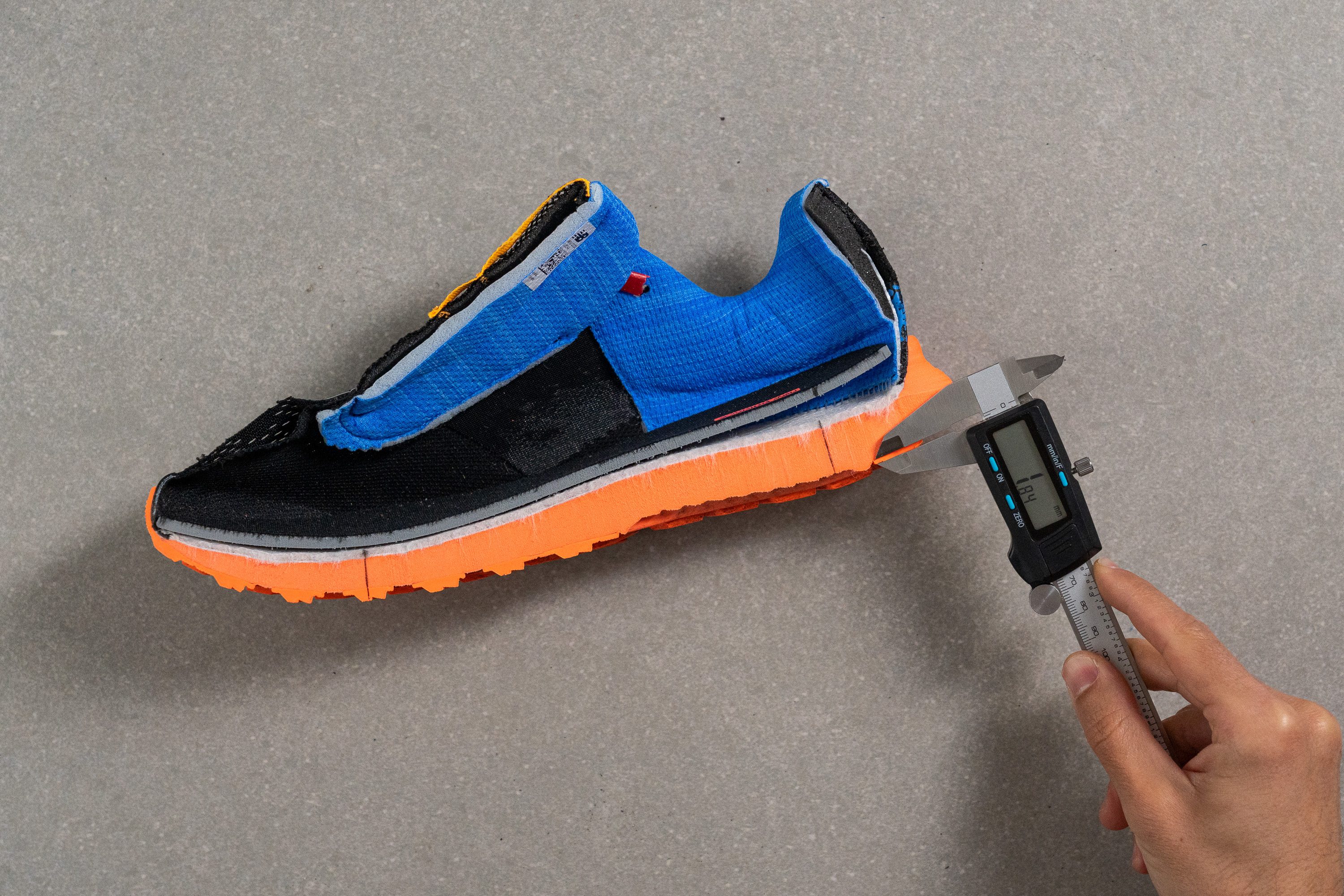
| DynaSoft Nitrel v5 | 1.8 mm |
| Average | 2.2 mm |
Misc
Insole thickness
The insole has a standard thickness of 4.1 mm, so we think it should feel familiar to you. Additionally, we found it's made from comfortable EVA foam.
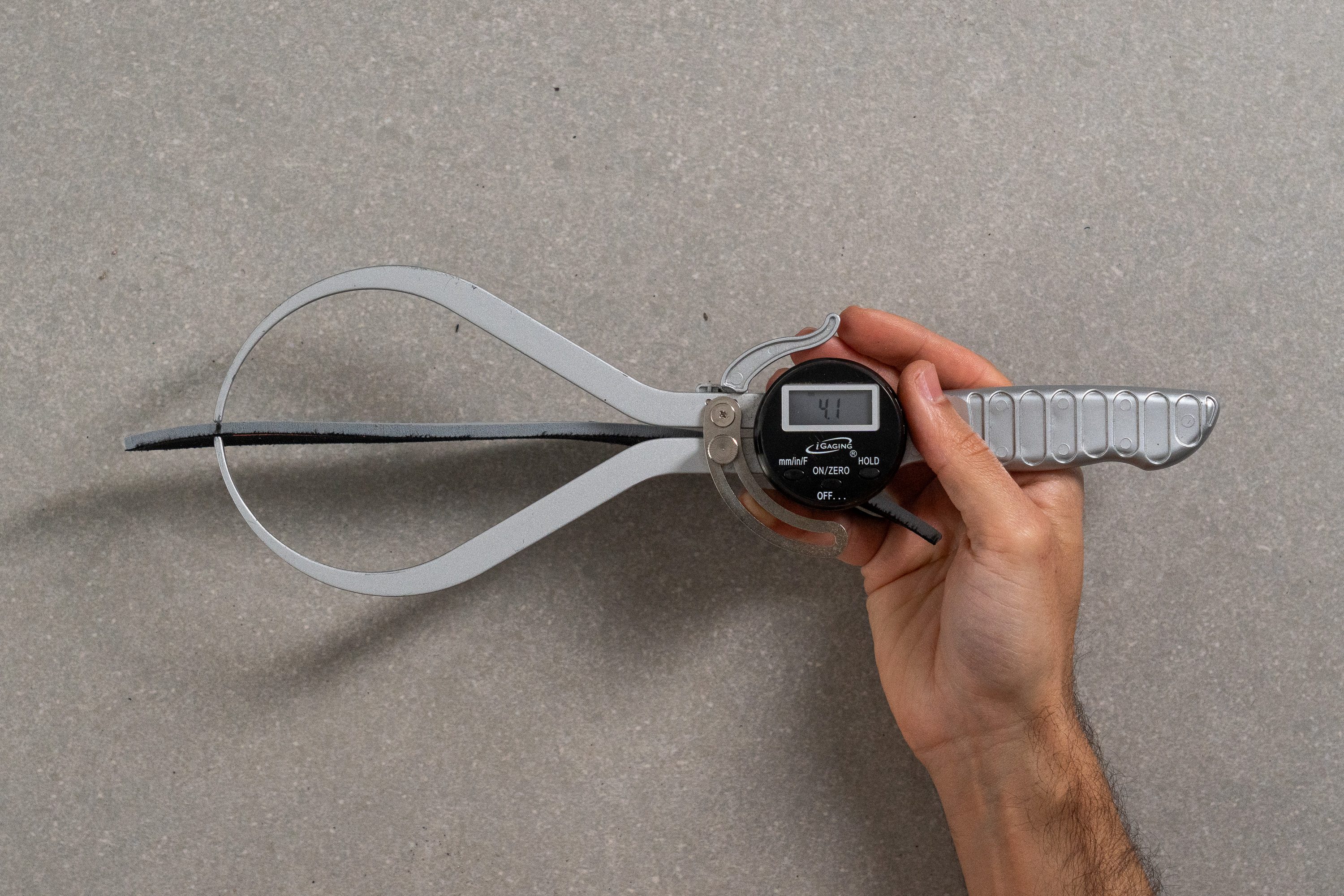
| DynaSoft Nitrel v5 | 4.1 mm |
| Average | 4.7 mm |
Removable insole
The insole is removable, but we don't recommend swapping it out for an aftermarket option.
Why? Well, the insole's design is quite unique, very different from what you typically find in other insoles in the midfoot area, as you can see in the picture below.
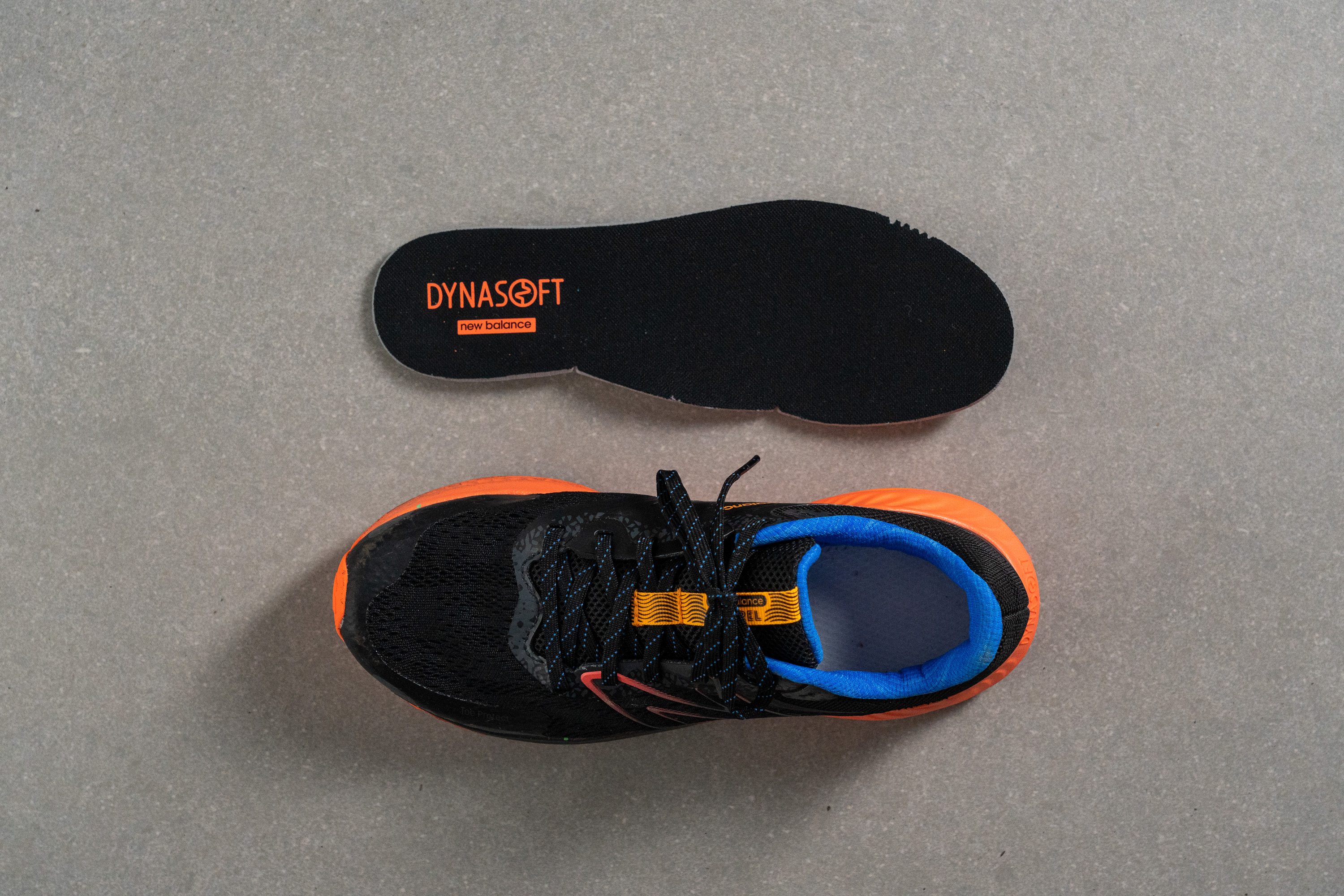
| DynaSoft Nitrel v5 | Yes |
Midsole softness in cold (%)
We wanted to see how the Nitrel v5 fared in true winter temps, so we tucked it into our freezer for a 20-minute chill alongside our ice creams. Our subsequent durometer test revealed a 26.8% increase in firmness—pretty respectable for an affordable running shoe.
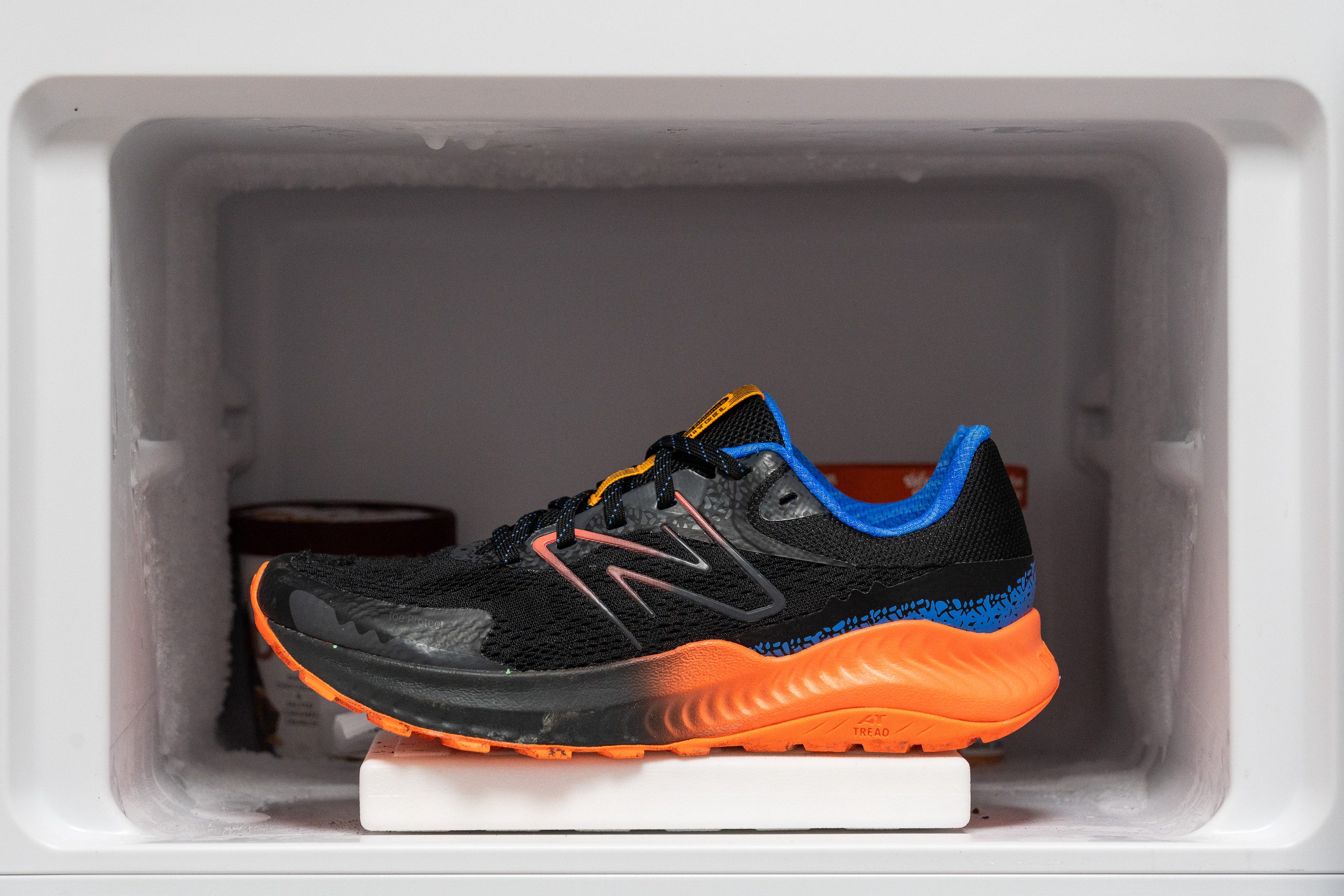
| DynaSoft Nitrel v5 | 27% |
| Average | 26% |
Reflective elements
Sadly, the Nitrel v5 doesn't come with any reflective elements. On the other hand, with its super-low price point, it's unrealistic to expect fancy features like that, even for a trail shoe.
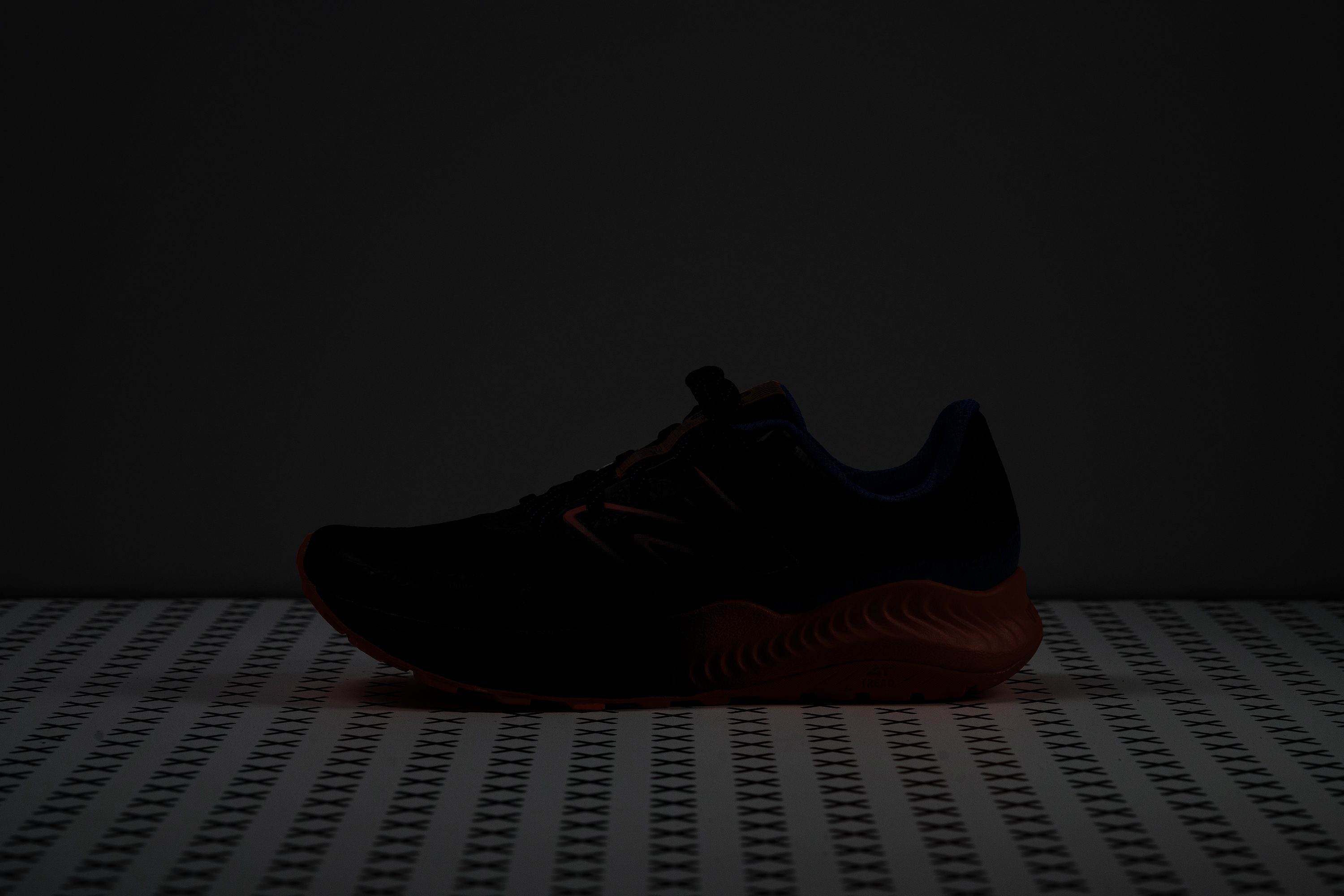
| DynaSoft Nitrel v5 | No |
Tongue padding
The tongue boasts an impressive 8.0 mm of thick padding, offering incredible comfort across the top of your foot with its two generous layers of foam.
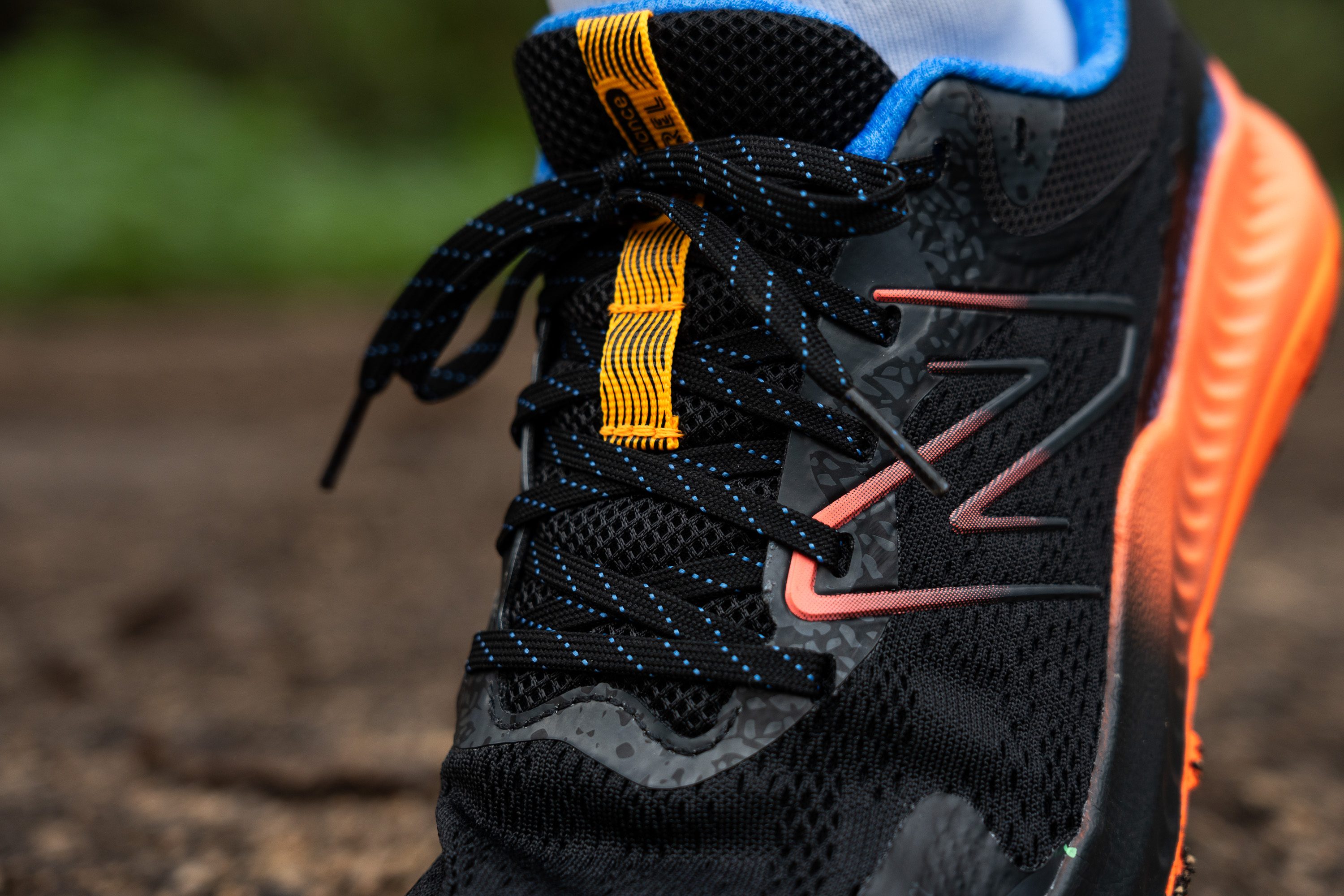
While the laces are decent quality, we did notice that the top eyelet sits a bit away. This could potentially be an issue for runners who prefer using a heel-lock lacing technique for that extra bit of support.
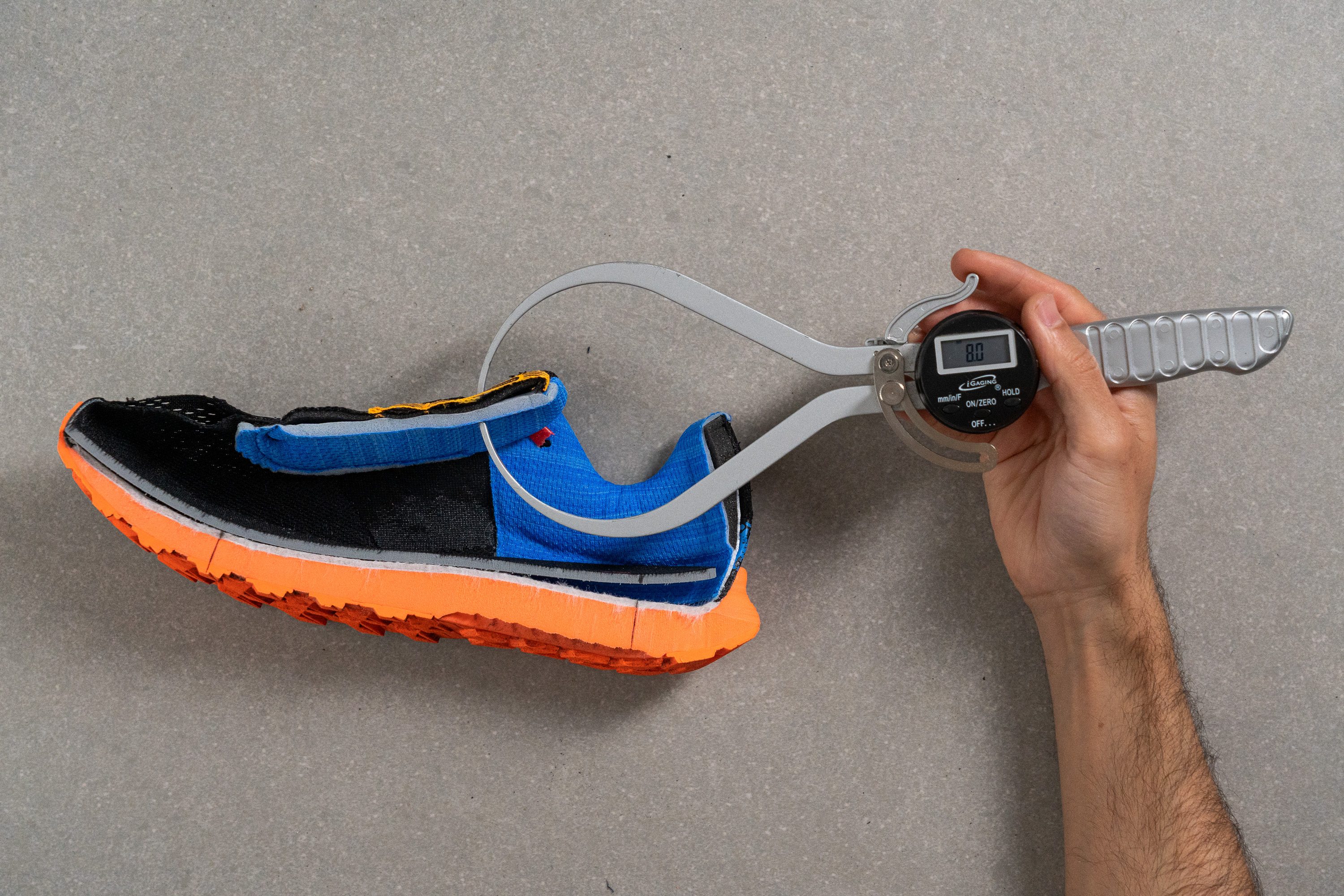
| DynaSoft Nitrel v5 | 8.0 mm |
| Average | 6.4 mm |
Tongue: gusset type
Sadly, this shoe doesn't feature a gusseted tongue—a bummer for any true trail shoe, as it can let debris slip inside.
Yet, with a budget-friendly MSRP of just £80, we know there's a limit to the bells and whistles we can realistically expect.
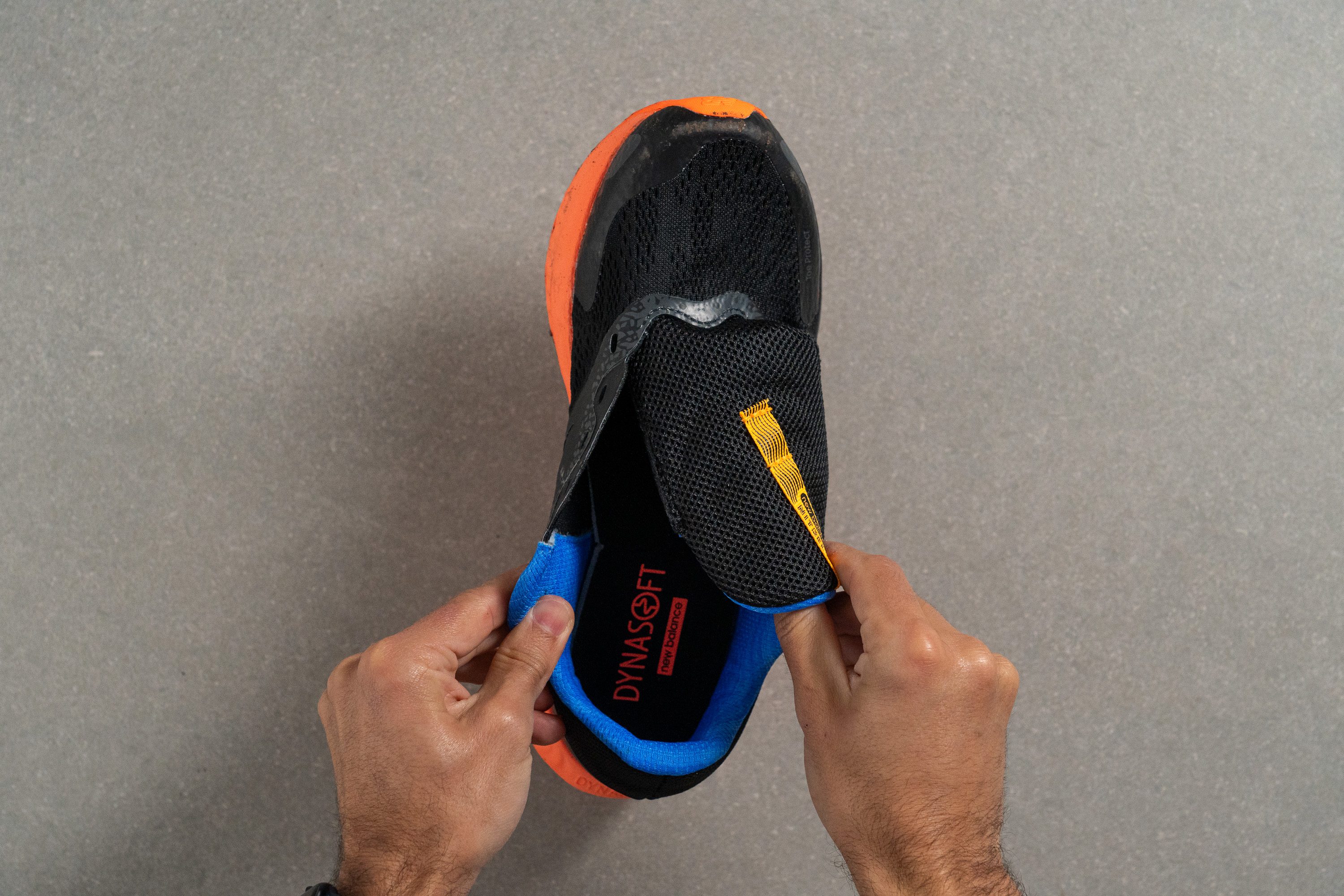
| DynaSoft Nitrel v5 | None |
Heel tab
There's no pull tab on the heel of this one, but honestly, we weren't surprised, at a price point of £80, all brands need to cut costs somewhere!
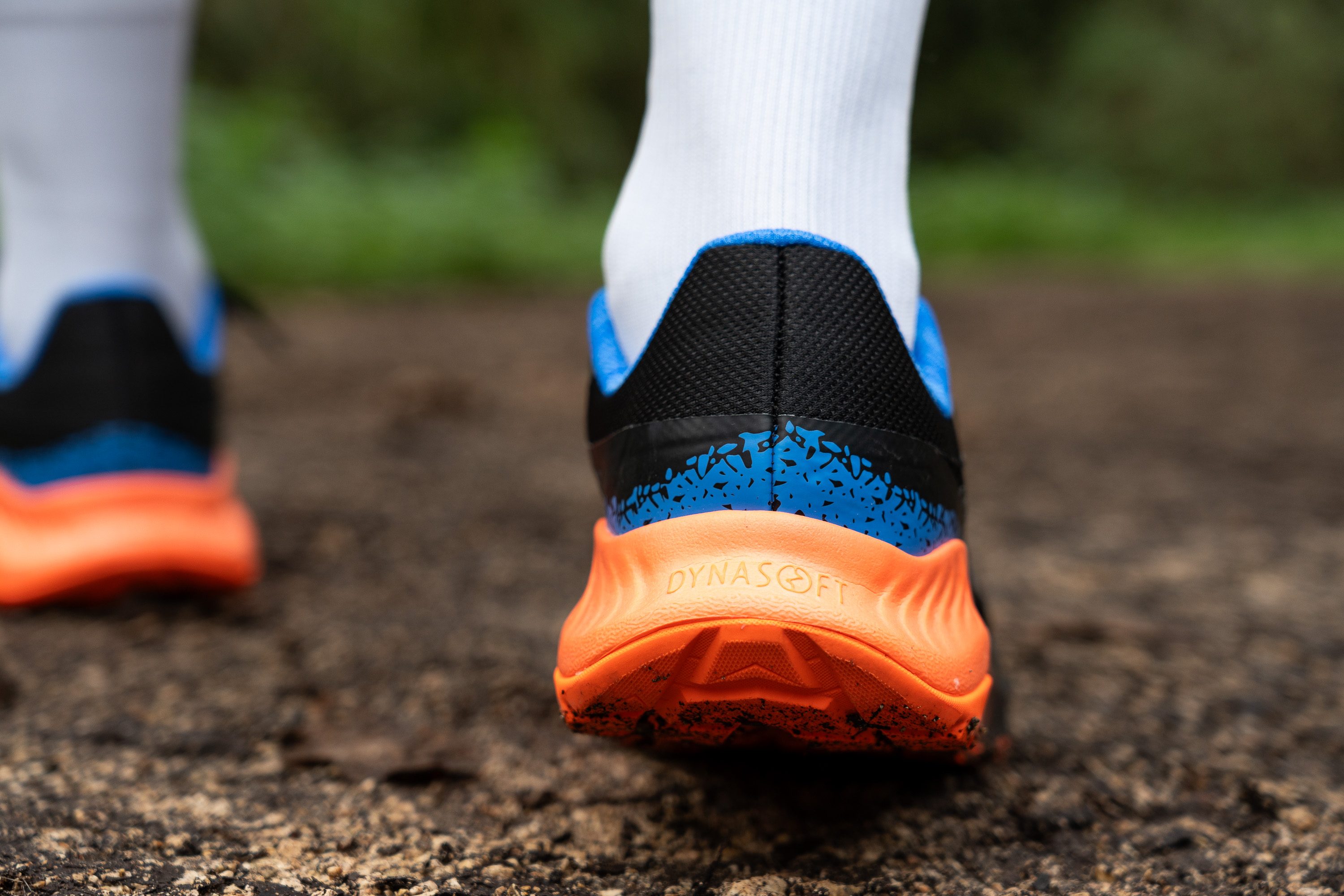
| DynaSoft Nitrel v5 | None |

